#It's literally called the medical INDUSTRY
Explore tagged Tumblr posts
Text
To add my own experience to this: I have a broken bone in my foot, part of that bone split off and now just, chills at the base of my little toe on the side of my foot.
I also have a cracked knee cap. On the same leg.
I work full time, pay ONE PAYCHECK out of TWO for the month in rent, the other one goes to bills, household expenses etc.
I don't have enough to even t h i n k about healthcare after everything.
The last two years I've been treating it myself because I can not afford to miss work long enough to have the surgeries and recover to a point I can go back to work - I would have to go back to work within a week or less in order to have money to pay bills AND make the medical payments.
I'm not in any sort of debt and I never plan to be because I can't afford to be.
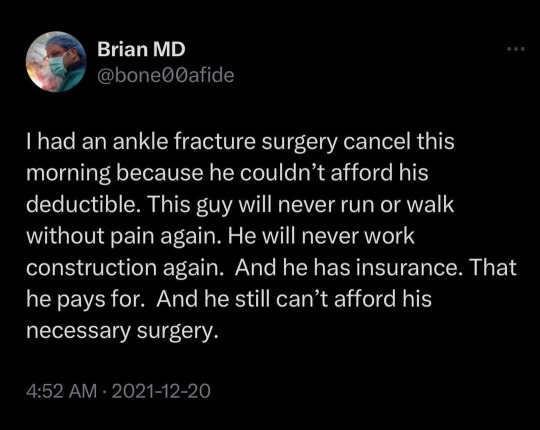
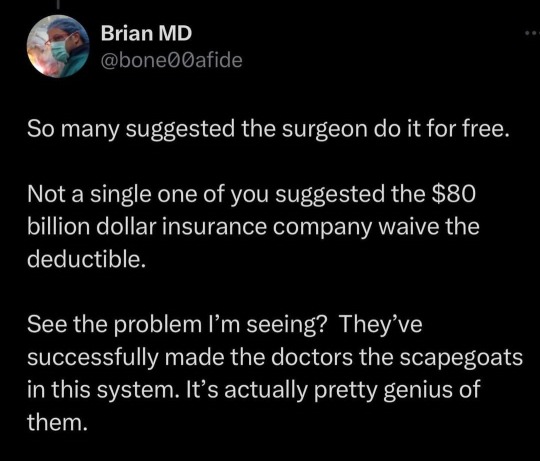
Abolish for-profit health care insurance.
#America isn't great#It's a shit sandwich dunked in doo doo water#It's literally called the medical INDUSTRY
114K notes
·
View notes
Text
by coincidence I'm also reading beloved by toni morrison which...is an incomparable depiction of slavery to say the least
#obviously the situation in VS was terrible but it was a thousand years ago and doesn't really have any bearing on today's world#meanwhile tens of thousands of black people in the us are literally still enslaved in so many industries through the prison system#ntm the other impacts of antiblackness such as police violence and medical abuse and educational disparities#the consequences of slavery and the generational trauma are impossible to overstate#I called VS realistic but that's like. for an action/adventure show. beloved is a literary masterpiece#and every few pages has something more brutal and heartbreaking than anything in this show#the difference in tone and perspective of the characters is...staggering#beloved lb
1 note
·
View note
Note
hi, i'm a fat person who is just starting to learn to love and appreciate my body and i'm very new to the fat community and all that.
i was wondering if you could maybe explain the term ob*se and how it is a slur. i've never heard anything about it being a slur before(like i said, i'm very new here) and was wondering if you could tell me the origin and history of the word or mayy provide links to resources about it? i want to know more about fat history and how to support my community but i'm unsure of how to start
Welcome!
Obesity is recognized as a slur by fat communities because it's a stigmatizing term that medicalizes fat bodies, typically in the absence of disease. Aside from the word literally translating to "having eaten oneself fat" in latin, obesity (as a medical diagnosis) straight up doesn't actually exist. The only measure that we have to diagnose people with obesity is the BMI, which has been widely proven to be an ineffective measure of health.
The BMI was created in the 1800s by a statistician named Adolphe Quetelet, who did NOT sudy medicine, to gather statistics of the average height and weight of ONLY white, european, upper-middle class men to assist the government in allocating resources. It was never intended as a measure of individual body fat, build, or health.
Quetelet is also credited with founding the field of anthropometry, including the racist pseudoscience of phrenology. Quetelet’s l’homme moyen would be used as a measurement of fitness to parent, and as a scientific justification for eugenics.
Studies have observed that about 30% of so-called "normal weight" people are "unhealthy" whereas about 50% of so-called "overweight" people are “healthy”. Thus, using the BMI as an indicator of health results in the misclassification of some 75 million people in the United States alone. "Healthy" lifestyle habits are associated with a significant decrease in mortality regardless of baseline body mass index.
While epidemiologists use BMI to calculate national "obesity" rates, the distinctions can be arbitrary. In 1998, the National Institutes of Health lowered the overweight threshold from 27.8 to 25—branding roughly 29 million Americans as "overweight" overnight—to match international guidelines. Articles about the "obesity epidemic" often use this pseudo-statistic to create a false fear mongering rate at which the United States is becoming fatter. Critics have also noted that those guidelines were drafted in part by the International Obesity Task Force, whose two principal funders were companies making weight loss drugs. Interesting!!!
So... how can you diagnose a person with a disease (and sell them medications) solely based upon an outdated measure that was never meant to indicate health in the first place? Especially when "obesity” has no proven causative role in the onset of any chronic condition?
There is a reason as to why fatness was declared a disease by the NIH in 1998, and some of it had to do with acknowledging fatness as something that is NOT just about a lack of willpower - but that's a very complicated post for another time. You can learn more about it in the two part series of Maintenance Phase titled The Body Mass Index and The Obesity Epidemic.
Aside from being overtly incorrect as a medical tool, the BMI is used to deny certain medical treatments and gender-affirming care, as well insurance coverage. Employers still often offer bonuses to workers who lower their BMI. Although science recognizes the BMI as deeply flawed, it's going to be tough to get rid of. It has been a long standing and effective tool for the oppression of fat people and the profit of the weight loss industry.
More sources and extra reading material:
How the Use of BMI Fetishizes White Embodiment and Racializes Fat Phobia by Sabrina Strings
The Bizarre and Racist History of the BMI by Aubrey Gordon
The Racist and Problematic History of the Body Mass Index by Adele Jackson-Gibson
What's Wrong With The War on Obesity? by Lily O'Hara, et al.
Fearing The Black Body: The Racial Origins of Fat Phobia by Sabrina Strings
#inbox#resources#the bmi is bullshit#fat liberation#fat acceptance#fat activism#bmi#medical fatphobia
988 notes
·
View notes
Note
Everyone clap for tyler he is so smart
you seem like a very rude person
i just passed my first quiz with 100% are u proud of me

54 notes
·
View notes
Note
That level of confidence on rejecting anything beyond what a MD will tell you (and not even a DO apparently?) has reached peak stupid I see. Probiotics work. Saccharomyces boulardii straight up saves lives. Come the fuck on.
I haven't criticized DOs, DOs are fully qualified physicians. For those not aware: In the US a Doctor of Osteopathic Medicine (DO) has the same qualifications as an MD; if you want a doctor who does more holistic care but is a real-ass doctor, look for a DO.
DC, doctor of chiropractic, is the degree that you get from the ITT Tech of medical schools to lie to people and call yourself a doctor.
Saccharomyces boulardii is one of the probiotics included in the recommendations of the AGA as conditionally recommended in spite of low quality of evidence.

Saying "probiotics are largely woo" and including a link to A) guidelines that recommend evidence-based use of probiotics and B) a commentary on those guidelines lamenting that the lax regulation of the supplement industry has made it excessively difficult to study potentially helpful interventions is not the same thing as saying "probiotics don't work."
I know it can be hard to see but on tumblr when there's a little line under some words that means the words are a link; you can place your cursor over that link and single-click to go to a different page of the internet that might include more words you can read are a much longer and more comprehensive explanation of the words that you initially clicked on.
There's no conclusive evidence that regular supplementation of probiotics improves digestive issues in healthy people and taking probiotics regularly if you are not at risk for c. diff likely means that you're just shitting money down the drain.
Aspirin saves lives too, but that doesn't mean that literally everyone should take it daily for its life-saving benefits.
I became *absolutely ironclad* in my support for evidence based medicine over medical woo after my chronic illness diagnosis and while trying to figure out how to not feel sick all the time. Getting diagnosed with celiac in 2012 meant getting inundated with books like Wheat Belly and links to Joseph Mercola and advice to take probiotics and to stop eating the yoga mat chemical. Navigating a chronic illness and *massive dietary changes* on an internet awash with medical woo was a nightmare, and you're making the exact same kind of argument that I stumbled across on a ton of forums where parents were trying to treat their kids' symptoms, or where people were searching for help with their own pain and struggles and were getting *bad fucking answers* about probiotics and essential aminos and diatomaceous earth.
Probiotics "work" to help some people in extremely specific situations, but, like most supplementation, they are absolutely unnecessary for the vast majority of people and unless you know that you have a specific condition that will be improved by taking them, you're mostly spending a lot of money to swallow a lot of things and shit them out. If you have a gut disorder, probiotics will not make your gut disorder better. If you have diarrhea as a result of food borne illness, probiotics will not get your poop back to normal. If you are constipated, probiotics will not soften your stools or make you more regular. If you are at risk of c. diff from a course of antibiotics and you are NOT immune compromised, probiotics may potentially reduce your risk of c. diff infection and you should talk to a doctor who is treating you for that specific situation about whether or not probiotics might be helpful in the short term while your gut microbiome recovers from the antibiotics.
233 notes
·
View notes
Text

Today, as you read this [...], there are almost 2 million people locked away in one of the more than 5,000 prisons or jails that dot the American landscape. While they are behind bars, these incarcerated people can be found standing in line at their prison’s commissary waiting to buy some extra food or cleaning supplies that are often marked up to prices higher than what one would pay outside of those prison walls. [...] If they want to call a friend or family member, they need to pay for that as well. And almost everyone who works at a job while incarcerated, often for less than a dollar an hour, will find that the prison has taken a portion of their salary to pay for their cost of incarceration. [...] These policymakers and government officials also know that this captive population has no choice but to foot the bill [...] and that if they can’t be made to pay, their families can. In fact, a 2015 report led by the Ella Baker Center for Human Rights, Forward Together, and Research Action Design found that in 63 percent of cases, family members on the outside were primarily responsible for court-related costs [...].
Rutgers sociology professor Brittany Friedman has written extensively on what is called “pay-to-stay” fees in American correctional institutions. In her 2020 article titled, “Unveiling the Necrocapitalist Dimensions of the Shadow Carceral State: On Pay-to-Stay to Recoup the Cost of Incarceration,” Friedman divides these fees into two categories: (1) room and board and (2) service-specific costs. Fees for room and board -- yes, literally for a thin mattress or even a plastic “boat” bed in a hallway, a toilet that may not flush, and scant, awful tasting food -- are typically charged at a “per diem rate for the length of incarceration.” It is not uncommon for these fees to reach $20 to $80 a day for the entire period of incarceration. The second category, what Friedman refers to as “service-specific costs,” includes fees for basic charges such as copays or other costs for seeing a doctor or nurse, programming fees, email and telephone calls, and commissary items.
In 2014, the Brennan Center for Justice documented that at least 43 states authorize charging incarcerated people for the cost of their own imprisonment, and at least 35 states authorize charging them for some medical expenses. More recent research from the Prison Policy Institute found that 40 states and the federal prison system charge incarcerated people medical copays.
It’s also critical to understand how little incarcerated people are paid for their labor in addition to the significant cut of their paltry hourly wages that corrections agencies take from their earnings. Nearly two-thirds (65 percent) of incarcerated people work behind bars. According to the Prison Policy Initiative, those who work regular jobs in prisons such as maintaining the grounds, working in the kitchen, and painting the walls of the facilities earn on average between $0.14 and $0.63 an hour. [...] Arkansas and Texas don’t pay incarcerated workers at all, while Alabama only pays incarcerated workers employed by the state’s correctional industry. [...]
For example, if someone sends an incarcerated person in Florida $20 online, they will end up paying $24.95. [...]
Dallas County charges incarcerated people a $10 medical care fee for each medical request they submit. In Texas prisons, those behind bars pay $13.55 per medical visit, despite the fact that Texas doesn’t pay incarcerated workers anything. Texas is one of a handful of states that doesn’t pay incarcerated people for their labor.
In Kentucky’s McCracken County Jail in Paducah, it costs $0.40 a minute for a video call; this translates into $8.00 for each 20-minute video call. [...] For those who need to use email, JPay charges $2.35 for five emails for people in the Texas prison system ($0.47 an email). [...]
People in Florida prisons pay $1.70 for a packet of four extra-strength Tylenol and $4.02 for four tampons. And with inflation, commissary items are priced higher than ever. For example, according to the Kentucky Center for Investigative Reporting, incarcerated people in Kentucky experienced a 7.2 percent rise in already-high commissary prices in July 2022. Researchers noted that a 4.6-ounce tube of Crest toothpaste, which costs $1.38 at the local Walmart, is $3.77 at the prison commissary. [...]
In Gaston County, North Carolina, incarcerated individuals who participate in state work release may make more than the state’s $0.38 an hour maximum pay, but they pay the jail a daily rate based on their yearly income of at least $18 per day and up to $36 per day. In fact, Brennan Center research indicates that almost every state takes a portion of the salary that incarcerated workers earn to compensate the corrections agency [...].
These room and board fees are found throughout the nation’s jails and prisons. Michigan laws allow any county to seek reimbursement for expenses incurred in relation to a charge for which a person was sentenced to county jail time -- up to $60 a day. Winnebago County, Wisconsin, charges $26 a day to those staying in its county jail.
---
Text by: Lauren-Brooke Eisen. “America’s Dystopian Incarceration System of Pay to Stay Behind Bars.” Brennan Center for Justice. 19 April 2023. [Bold emphasis and some paragraph breaks/contractions added by me.]
2K notes
·
View notes
Text
Actually? WOULD Earth be the ones to petition Oa?
They are interstellar Space Interpol. You don't usually call them on different parts of your OWN settlements or systems. You call them in when someone is breaking THE Laws. Not necessarily YOUR laws, though obviously by breaking THE laws they clearly ARE. But THE Big Laws(tm).
Like Geneva Convention for Space type laws.
You have discovered Planet or King X is committing WAR CRIMES. Call Oa. Tax fraud? That's an inter-personal planet side issue they can't help you with. Pointing Nukes at your nursery settlement and threatening to blow up the infants there unless you give them sex-slaves?
Knock-knock! Taste HARD Light Constructs!
But if so? Then how would the situation get so out of hand on Earth? With the G.I.W.? Simple. Tell me, Mr. President, what do you know of the current day to day life of villagers in rural Siberia?
That they exist? Could you even NAME their village, if I referenced specific individuals? Likely not. And no one would realistically expect you too.
There are countless planets out there! With Leaders busy with local industrial conferences and infrastructure bills. Farming regulations. Talks with that planet a few stars over. Very busy. What do THEY know of Earth? Why would they NEED too?
But! As we know, Ectoplasm is EVERYWHERE. Not just earth. And? Thin spots are not just an Earth-centric phenomenon. Other planets most CERTAINLY would have them too. And depending on the species? The culture? To quote the wise sage Bill Wurtz "you can make a religion out of this!"
After all, chosen few, returned from death... glowing and more powerful then before? Immortal? It's a pretty reasonable conclusion to come too. They are clearly Gods Touched. Some sacred task they must complete.
It would likely even shape the ghosts of the region themselves. After all, they TOO, would believe they were chosen for some Important Religious Task. Be it study or collecting rocks. To what end? Unknown. Who are they to question The Gods?
But! Oh happy day! The old tyrant is no more! A chosen Hero! They go to greet him! Honor him, as you do. Traditional gifts and ballads. Maybe some sacred rocks. A fancy hat. But? Oh? The Champion is wounded! Gasp! Still? But the fight with Pariah happened-
And then they are given Grave Warning(tm). Don't go to Earth. Heretics attacking people. KILLING souls! Trying to KILL the king of all the Infinite! He is somber because his living parents were hurt. Preventing the END OF ALL THINGS!!!??
WHAT!?
These "People In White" tried to EXPLODE the very FABRIC of all realities!? Several of them faint. Truely, these Fentons MUST be chosen by the Gods! Heros. Legends. Such bravery in the face of such HORRORS. Please, let them be brought to their Living counterparts! The hospitals are quite good!
And you know what? Fuck it. Danny will take that. Because his Mom n Dad got hurt. BAD.
They learned he was Phantom at probably the SINGLE worst time imaginable and still chose HIM. Chose THEM. The GIW were coming for him. Gonna hurt Jazz. And his parents told them, with fire and blood, it'd be a cold day in hell before they let them so much as TRY it.
They BLEW UP their own life's work. Went literally scorched earth. And now? They're not doing so good.
Because the Zone isn't made for the living. No food, no water, and no real human-safe medical supplies. They've run out. Danny will take what he can get. He'd even go to Vlad but... his Portal's gone too. And the Buzzards said he looked... spirally. Very... "suicide runs until everything BURNS".
So, yeah. No one's doing so great.
Alien planet it is.
They are greeted with fanfare and respect. The best medical teams on the PLANET. The King and his family is there, to welcome him. It's... it's beautiful. Hardly some perfect utopia, but the air is lite. Art everywhere. The stars vivid and so easy to see, at night.
The King kinda reminds him of Mr. Lancer to be honest. Balding and a bit round around the middle, stern but endlessly fair about it, wants people to do their best and succeed in life. Maybe that's why Danny finds himself opening up. Because... because here is a real, honest to God, KING king.
Somebody who was actually TRAINED to do all this King stuff.
Unlike Danny.
And Danny? He's scared. People expect him to Lead now. To know what he's doing. To somehow just... suddenly KNOW how to do all these things he's never even heard about. He only barely just died. Has BARELY been keeping everybody safe.
BARELY stopped Pariah.
He doesn't know what to do. But he pours his guts out. All the things that have bottled up. And King Not-Lancer listens. Somber and thoughtful. There is little, if anything he can TRUELY do to help. But... there ARE things he can do. Lessons on statescraft, while he's here, for one.
As for the other? Well, as King, he does have the local Lantern's Call Sign. Not to be used lightly, mind you. But what Danny describes? And from what the Sacred Ones have reported? THAT must be reported to Oa. He can show Danny how to do that.
(He does)
[The Lanterns of Earth get a VERY exciting call from Oa. Are every different shade of pissed. But? Whoops! Looks like they ACCIDENTALLY put the Watchtower into a complete Quarantine! Well, dang. Guess we're all stuck here for two weeks!
Reset it? *sound of smashing computer terminal* Yeah, don't think that's gonna work! :)
WHO WANTS TO PLAY 20 QUESTIONS?? We'll start! :) Who here has heard of an organization called, and I quote, The Ghost Investigation Ward? :) ]
@hdgnj @ailithnight @nerdpoe @the-witchhunter
#dpxdc#dcxdp#dc x dp prompt#tw violence#tw slavery#not sure if i got everything#but i hope that helped
899 notes
·
View notes
Text
“By 1900 child mortality was already declining—not because of anything the medical profession had accomplished, but because of general improvements in sanitation and nutrition. Meanwhile the birthrate had dropped to an average of about three and a half; women expected each baby to live and were already taking measures to prevent more than the desired number of pregnancies. From a strictly biological standpoint then, children were beginning to come into their own.
Economic changes too pushed the child into sudden prominence at the turn of the century. Those fabled, pre-industrial children who were "seen, but not heard," were, most of the time, hard at work—weeding, sewing, fetching water and kindling, feeding the animals, watching the baby. Today, a four-year-old who can tie his or her own shoes is impressive. In colonial times, four-year-old girls knitted stockings and mittens and could produce intricate embroidery; at age six they spun wool. A good, industrious little girl was called "Mrs." instead of "Miss" in appreciation of her contribution to the family economy: she was not, strictly speaking, a child.
But when production left the houschold, sweeping away the dozens of chores which had filled the child's day, childhood began to stand out as a distinct and fascinating phase of life. It was as if the late Victorian imagination, still unsettled by Darwin's apes, suddenly looked down and discovered, right at knee-level, the evolutionary missing link. Here was the pristine innocence which adult men romanticized, and of course, here, in miniature, was the future which today's adult men could not hope to enter in person. In the child lay the key to the control of human evolution. Its habits, its pastimes, its companions were no longer trivial matters, but issues of gravest importance to the entire species.
This sudden fascination with the child came at a time in American history when child abuse—in the most literal and physical sense—was becoming an institutional feature of the expanding industrial economy. Near the turn of the century, an estimated 2,250,000 American children under fifteen were full-time laborers—in coal mines, glass factories, textile mills, canning factories, in the cigar industry, and in the homes of the wealthy—in short, wherever cheap and docile labor could be used. There can be no comparison between the conditions of work for a farm child (who was also in most cases a beloved family member) and the conditions of work for industrial child laborers. Four-year-olds worked sixteen-hour days sorting beads or rolling cigars in New York City tenements; five-year-old girls worked the night shift in southern cotton mills.
So long as enough girls can be kept working, and only a few of them faint, the mills are kept going; but when faintings are so many and so frequent that it does not pay to keep going, the mills are closed.
These children grew up hunched and rickety, sometimes blinded by fine work or the intense heat of furnaces, lungs ruined by coal dust or cotton dust—when they grew up at all. Not for them the "century of the child," or childhood in any form:
The golf links lie so near the mill
That almost every day
The laboring children can look out
And see the men at play.
Child labor had its ideological defenders: educational philosophers who extolled the lessons of factory discipline, the Catholic hierarchy which argued that it was a father's patriarchal right to dispose of his children's labor, and of course the mill owners themselves. But for the reform-oriented, middle-class citizen the spectacle of machines tearing at baby flesh, of factories sucking in files of hunched-over children each morning, inspired not only public indignation, but a kind of personal horror. Here was the ultimate "rationalization" contained in the logic of the Market: all members of the family reduced alike to wage slavery, all human relations, including the most ancient and intimate, dissolved in the cash nexus. Who could refute the logic of it? There was no rationale (within the terms of the Market) for supporting idle, dependent children. There were no ties of economic self-interest to preserve the family. Child labor represented a long step toward that ultimate "anti-utopia" which always seemed to be germinating in capitalist development: a world engorged by the Market, a world without love.”
-Barbara Ehrenreich and Deirdre English, For Her Own Good: 150 Years of the Experts’ Advice to Women
536 notes
·
View notes
Text
The Intern
AO3
Inspired by a variety of DPxDC posts, but mostly this one by @gettingcomfyinyourwalls
.
Before Danny's Accident, he and Jazz had competed for the title of "the normal one" with an intensity and ferocity achievable only by siblings in families where there was no normal one. After the Accident, he had to cede the title, however reluctantly, to his sister, who then, in a turn around only possible for siblings, then dedicated herself to giving Danny the title of "the one everyone thinks is the normal one." Combined with his chosen friend group - a girl who pursued weird as a lifestyle, and the kid who once tried to use a tamagotchi to hack a vending machine, then gave the tamagotchi an Egyptian burial when the attempt killed it - it was very easy to forget that Danny was not normal at all. Not even if you ignored the whole "half-ghost superhero" thing, which was very difficult to ignore.
It was even easier to forget what kind of not normal he originally was, before the accident, and continued to be even afterward.
However, the world (and particularly Sam and Tucker) was about to be reminded.
"Guys!" shouted Danny, literally skipping up the hallway to come to a bouncing stop between Sam and Tucker. "Guess what!" He was quivering with so much excitement that his edges looked a little blurry.
Tucker put a hand on his shoulder to get him to stop. "I guess it's a good thing, and not that your parents invented a ghost wiggler or something?"
Danny stilled. "The ghost wiggler. My enemy."
"Wait, I was joking."
"Mom and Dad weren't. That thing was evil."
"Okay, okay," said Sam, raising her hands, "it didn't have anything to do with one of your parents' inventions. What did happen?"
"Two of my summer internship applications were accepted," said Danny, almost sparkling with delight.
Actually, he was sparkling. If he had an internship outside of town, he would have to get that under control.
"That's great," said Sam. "Which ones?"
"Lexcorp and Wayne Industries!"
"Lexcorp?"
"Wayne Industries?"
"You applied to Lexcorp?" demanded Sam, appalled.
"You're going to Gotham?" asked Tucker in the same tone.
Danny looked from Sam to Tucker, then back again. "Yessssss?"
"To work for the guy you call Bald Vlad? The one who keeps trying to kill Superman?"
"The place with all those crazy villains and mad scientists? That Gotham?"
Then, together, they asked, "Why did you even apply there?"
"Lexcorp is a civilian leader in astronautics, meteoritics, cosmochemistry, nuclear physics, quantum computing, robotics and medical research."
"Because Lex Luthor is trying to kill Superman."
"And even beyond Wayne Industries, there are so many great scientists in Gotham, like Dr. Isley, Dr. Crane and even Dr. Fries!"
"Danny, those are the villains."
"Well," said Danny, "I figure I'm never going to meet Lex Luthor, being an intern and all, but if I see any dangerous weapons, I can trash them! I have lots of experience."
"Don't you think it might be a little dangerous for you to work for an avowed human supremacist?"
"It’s not any different from staying home."
Sam leaned back to stare at a point over Danny's head, flummoxed.
Tucker, not liking his point being ignored, squeezed Danny's shoulder. "If you miss fighting that much, I'm sure any ghost you ask will be happy to spar with you. The villains, Danny. Why do you want to go somewhere with that many villains?"
"It's not like I'm joining them." Danny rolled his eyes. "I just want to talk to them. If you're so concerned, I can take Dr. Isley and Dr. Crane off the list."
"Why only those two? Why not get rid of the whole list?" asked Tucker, shaking him slightly.
"Because Dr. Isley was mostly for Sam and Dr. Crane was mostly for Jazz. Dr. Fries is for me, and Mom and Dad want me to try to convince cousin Hugo to try therapy again."
"Why," said Sam, as Tucker glared at her, "do you think I'd want you to talk to Poison Ivy?"
"Uh," said Danny, "because you admire her work?"
"Admired, past tense, and that was before she started turning people into trees."
“But the ‘turning people into trees’ part is way more applicable to our lives!”
“Forget about that,” said Tucker. “Why do you want to talk to Mr. Freeze?”
“Well, Doctor Fries is an expert in cryogenics and incorporating ice into technology. I want to be able to do that.” Danny looked back and forth between Sam and Tucker. “Come on, I’m not interning for him. I just want to expand my knowledge base! Just think about all the cool things I could make!”
Sam and Tucker, united in horror and purpose, grabbed Danny by the arms and dragged him bodily into Senior English.
"Jazz," said Sam, hauling Danny forward by the arm she held, "your brother is turning into a mad scientist!"
Jazz looked from Sam, to Danny, to Tucker, then back to Sam. "Yessssss?"
"Well," huffed Sam, "aren't you going to do anything about it?"
"No? Why would I?"
“Mad scientist,” repeated Sam.
“That’s generally a bad thing,” said Tucker.
“It’s fine. Danny has a very strong sense of ethics.”
“And lab safety!” chimed in Danny.
“And lab safety,” agreed Jazz, nodding. “Now, if you want me to help you with your internalized prejudice, I can refer you to some resources I’ve found quite helpful myself.”
“Internalized prejudice is when you’re biased against yourself,” said Tucker.
“Yes.” Jazz returned to the task of arranging her pens and notebook on her desk.
“Wait,” said Sam, “you are not calling us mad scientists, are you?”
“Well,” said Jazz, “Mad Science Disorder isn’t in the DSM, but there’s a movement to have it included in the next edition, and I think you would fit the proposed diagnostic criteria.”
“No,” said Sam.
“Yes,” said Danny.
“I have seen the inside of your greenhouse, Sam,” said Jazz. “You’re at least on the road to being a mad botanist, if not a mad ecologist.”
“I’ve been saying that for years,” said Tucker.
“And you’re obviously a mad computer scientist, with a minor in archaeology.”
“Wait, why are you saying this like they’re college majors?” asked Tucker.
“It’s easier that way,” said Jazz.�� She frowned slightly. “I’m not saying it’s a bad thing. It’s just that you should be aware of it, so you don’t wake up one day and start planning involuntary human drug trials, or something like that.”
“Jazz did that, once. I was five.”
The warning bell rang.
“You should go to class,” said Jazz, pleasantly. “You don’t want to be late.”
.
“Listen,” said Sam, leaning over the desk to whisper at Danny, “couldn’t you, I don’t know, just do the Wayne internship?”
“Hm,” said Danny, rubbing his chin, “maybe. But I kind of get the feeling I only got the Wayne internship because I got the Lexcorp one.”
“What are you talking about?”
“I mean, like we talked about way back, Bruce Wayne has to be funding the Justice League, at least a little.” He pushed his math homework - already finished - to one side. “It’d make sense for him to keep an eye on anyone Lex Luthor personally hires, on account of the Superman thing. It’s either that or corporate espionage.”
“Wait,” said Tucker, leaning in from the side, “go back to the ‘personally’ part.”
“It’s a special internship?” said Danny, somehow still managing to pull off the clueless innocent look. “It was, like, competitive? You know what I mean.”
“Luthor personally hired you? Reviewed your application and whatever?”
“Yeah.”
“And you think he isn’t going to meet you?”
“Why would he? I’m basically going to be getting a tour, then doing drudgework for a month.”
“I love you, man, but you are so, so dumb sometimes. The man is going to meet you. Jeez, I hadn’t even heard he was doing internships like that for our age group.”
“Age group?” asked Danny.
“Dude. No. Tell me it was at least limited to just high schoolers. Tell me you didn’t apply for an internship meant for college students.”
“There wasn’t any age on it as far as I remember.”
“Mr. Fenton,” said Mr. Falluca, “will you please come solve this triangle for the class?”
Danny huffed. “Rule of cosines,” he said as he stood. “Give me an easy problem…”
“Why is he even in this class?” mumbled Sam.
“Ghost hunting,” Tucker mumbled back.
.
“How are you even going to get to Metropolis?” asked Sam as they walked away from the school. “You don’t have your license yet.” He probably wouldn’t have his license ever. Three Fentons driving had, evidently, proven too much for the local DMVs. Jazz, as conscientious as she was, had gotten hers from the one in Elmerton before they, too, realized the horror that was Jack and Maddie.
“Jazz is going to take me,” said Danny with a little shrug. “She’s doing a pre-college thing there. Some kind of volunteer thing.”
“And how are you getting to Gotham?”
“There’s a train that goes there,” said Danny. “Like, a regular one.”
“And getting back?”
“Mom and Dad will pick me up.”
“Where will you be sleeping?”
“There’s on-site dorms on each site.”
Sam curled her lips. “The return of company towns in the modern era.”
“I don’t know, I think the Wayne ones are probably fine.”
“But you’re sleeping in the Lexcorp ones?”
“I figure I can disable any subliminal programming devices that might be installed there.”
“Do you not see how crazy that sounds? Tucker, back me up, here?”
Tucker sighed. “Honestly, I don’t think we’re going to be able to change his mind. I’ve been picking out funeral flowers. You still like lillies?”
“It’ll be fine. I’ll call you guys if I need help. Just like you’ll call me if some new ghost shows up and starts causing trouble, right?”
“Yes,” said Sam, exasperated. “But you understand those two things aren’t the same, right? That with the way things are here, there probably won’t be a new ghost causing trouble?”
Danny had made… peace probably wasn’t quite the right word, with the Fentons, the Guys in White, and the lack of an organized overarching social structure, but there was an understanding between him and the ghosts. Without that understanding, he wouldn’t have been able to take the time to apply for internships, let alone actually go to any.
“I mean, if it’s an imposition–”
“That’s not what she meant,” interjected Tucker. “Nope. Nope. You aren’t wriggling out of calling us when a supervillain kidnaps you. She’s trying to talk you out of taking an unnecessary risk.”
“It’s not really a risk for me, though.”
It really wasn’t. Danny might not be invulnerable, but the sheer variety of his powers along with his accelerated healing made that point academic. For most enemies.
“This is the guy who fights Superman, Danny,” said Sam. “For all we know, he’s got some kind of anti-ghost material in the same cabinet he keeps his Kryptonite.”
“I don’t think that’d work very well, actually,” said Danny.
“It was a metaphor. Be serious.”
“I am being serious. This is something I want to do. I want to go there and learn and prepare for the future.”
“You sound like Jazz, you know? You’ve got two more years here. You don’t have to do this. If this is some kind of overcorrection because of the ghosts–”
“It’s not. I told you why I wanted to do this.” He stopped on the sidewalk, pulling on the hem of his shirt. “Is it really that bad? Is it really that terrible that I’m going somewhere and doing something that I’m interested in?”
“No,” said Tucker, awkwardly. “We’re worried about you.”
“And I’ll be fine,” insisted Danny. “Really. I will be. And, you know, like I said, I want to do this kind of thing in the future, so it’s good practice.”
“For what?” asked Sam, crossing her arms. “Scamming supervillains?”
“Well, yeah,” said Danny. “That, too.”
Sam’s arms fell, along with her jaw. “What?”
“Scamming supervillains,” said Danny, starting to walk again. “Like, obviously, I want to either do something with spaceflight or something with a big humanitarian dimension, but scamming supervillains is definitely going to be my backup. Or maybe my hobby. They always have the coolest stuff, and a lot of money, too, usually.”
“Coolest stuff?”
“Yeah,” said Danny, almost skipping, now. “Ice rays, supercomputers, gene therapy, rapidly growing vegetation, limb regeneration, cloning techniques… Lex Luthor came up with a cure for, like, over half a dozen different types of cancer.”
“Because he wanted to kill Superman,” said Sam, taking up an earlier refrain. It had only
“Yeah, but imagine what he could do if we could convince him that Superman got his strength from, like, world hunger or something.”
“I hate it,” said Sam, after a long moment, “but I think you have a point.”
“You two could go into business with me. Some villains go through goons so fast, I bet we could hit them about a dozen times.”
“You’re not planning to do this now, though, are you?” asked Tucker.
“Huh? No. No, not until after graduation. Most I’ll do with any supervillains I see this time around is talk.”
“That’s a lie,” said Sam, immediately. “There’s no way. The first time Man-Bat or Brainiac jumps out of a sewer, you’re going to start swinging.”
“Man-Bat is a geneticist and a chiropterologist, you know,” said Danny. “I’d love to take Brainiac apart, though. Do you have any idea how many planets he’s wiped out? And the stuff he’s got to have–”
“You’re floating,” said Tucker.
“And glowing,” said Sam. “You’re really going to have to work on that.”
“Oops,” said Danny. “Sorry. It’s just, like, everything I’m Obsessed with.” He landed, but still fidgeted, as if shaping something invisible with his hands. Which he might have been. “It’s– I still want to help people.” The plaintive note in his voice made it clear that ‘want’ was, in this case, closer to ‘need.’ “I don’t mind doing the hero thing, and I can’t ignore a cry for help. But I’m not going to just waltz into someone else’s territory and start messing with stuff.”
“I think the territory thing is more of a ghost thing than a hero thing.”
“Eh,” said Danny, “I wouldn’t be so sure.”
.
Danny waved goodbye to Jazz as she pulled away from the curb, then grinned up at the Lexcorp building. Wow, it was tall. And probably had a lot of really sketchy stuff in the basement.
But! He wouldn’t start poking around with that stuff until he’d been there for at least a week.
(Okay, he’d probably last twenty-four hours at most, but who could blame him? How often did anyone get to poke around the lair of a supervillain who wasn’t their archenemy?)
He walked into the lobby, craning his neck this way and that to take it all in. It was… honestly pretty boring. Not unlike Vlad’s buildings. But he supposed that all corporate buildings were like that to some degree.
“Hello!” he said, walking up to the front desk. “I’m–”
“You’ll have to wait for your parents to come out, I’m afraid, sweetie,” said the secretary. “Company rules.”
Danny blushed. “No, um, I’m here for the internship? The Innovators of Tomorrow Today internship? I’m Danny Fenton. Daniel. Daniel Fenton.”
The secretary blinked at him, then looked down at her computer for a moment. “I’ll need to see some ID.”
“Will my passport be okay?” Danny asked, tugging on his bracelet to get it to lie more comfortably on his wrist. On account of the whole ‘no driver’s license’ problem, he didn’t have anything else, other than his student ID.
“That will be fine,” said the secretary, reaching for it. She looked it over carefully, becoming more and more confused. Danny wondered if she was expecting it to be fake or something. “You’re fifteen.”
“I know I’m short,” said Danny. “But I’m almost sixteen.”
“I see,” she said. “Well. Here’s your visitor badge. We’ll have someone come escort you to the meeting room shortly, and your internship badge will be ready when you start tomorrow. You can leave your luggage here, and it will be scanned and brought up to the dorms.”
Danny bobbed his head happily and took back his passport and the badge. He couldn’t wait to meet the other people he’d be working with. He bet that there’d be a lot of people his age, no matter what Tucker said after he looked it up and saw the website.
A tall man wearing an earpiece and some kind of weapon - a taser, probably - walked up to Danny a few minutes later and scanned his badge. With a few words, he directed Danny to an elevator - one with a keypad code - and brought him up to the tenth story. The elevator opened directly into a… Danny wasn’t entirely sure what to call it. It was square and very large and open, with soft, rounded furniture, a kitchenette, and a catered lunch spread out on several long tables. One wall was all windows, looking down into Metropolis, and another wall was covered in cool, art-deco Lexcorp posters.
There were a lot of people.
A lot of tall people.
A lot of tall, college-aged people. Older college-aged people, even. No teenagers.
Tucker had been right. Great.
A middle-aged woman extracted herself from the loose crowd and came over to Danny, smiling.
“Hello!” she said. “You must be Daniel Fenton. My name is Liberty Rue, I’m the coordinator for the Innovators of Tomorrow Today program.”
“Hi,” said Danny, “it’s nice to meet you.”
Ms. Rue nodded. “Thank you, thank you. We’re just giving everyone a chance to get to know each other before we start the orientation. Please feel free to take any of the refreshments and mingle. All of you are going to be working together closely. Your specialties were electrical engineering and space science?”
“Yes,” said Danny. Although, to be honest, he didn’t really have a specialty. He was more of a generalist.
(Unless you counted ghost science, but there was absolutely no way he was going to bring that up.)
“Excellent. Let me introduce you to the group you’ll be working most closely with–”
What followed was something of a whirlwind. It wasn’t that there was a lot of people, but it was one after the other, and Ms. Rue seemed to be… showing him off, almost? Or showing the other people off? In any case, there was a weird tension to it all.
Was it because he was younger?
He tried not to dwell on it too much, though, because everyone here had so much cool stuff to talk about. Almost all of them had been involved in serious graduate or undergraduate research projects. Strange matter, transient dimensions, reality fields, meta gene analysis, non-quantum teleportation, reproduction of extraterrestrial technologies… Danny was starting to feel a little inadequate. The project he’d sent in was a ‘theoretical’ blueprint for a spy-bot disabler. One that he was proud of, sure; getting a localized EMP effect without a nuke wasn’t easy, but it was doable. And the EMP part was definitely the ‘last resort’ stage of things. It was, after all, much better to hack into Vlad’s bugs and have them send him a hundred hours worth of rickrolls.
In the middle of a conversation about exactly how much room you needed for a decent particle accelerator, Ms. Rue stepped aside and put her hand to her ear. Danny hadn’t noticed the earpiece before, but now he looked at it with curiosity. It was well made, and he could barely hear it, even with his slightly augmented hearing. He wondered if they were designed to counter Superman.
“Mr. Fenton,” said Ms. Rue, “I’m sorry, but I’m going to have to steal you away for a moment.
“Okay,” said Danny. He followed her back to the elevator, stealing a cookie as he went. They weren’t as good as his Mom’s, but he was pretty sure they tasted the way they did because of their ectoplasm content, so…
Ms. Rue punched a code into the elevator and scanned her badge. “Alright, Mr. Fenton. Go ahead. You’ll be taken where you need to go.”
Well. That was maybe a little sketchy, but Danny was nothing if not curious. He got in. “I’ll be back in time for the orientation, right?”
“If you aren’t, I’ll make sure you’re shown around personally,” promised Ms. Rue.
The doors closed and the elevator went up. And up. Then stopped for a moment, during which Danny felt the tingle of a very thorough full-body scan. And up some more. All the way to the top. The doors opened to a sparkling office. Everything in it was white, chrome, or glass, with smooth straight lines and geometrically perfect curves. It blended perfectly with the skyline of Metropolis framed by the full-wall windows.
Between Danny and the windows was an enormous white desk. Behind the desk was Lex Luthor.
“Daniel Fenton,” said Lex Luthor, inclining his head ever so slightly towards Danny. “It is good to meet you.”
“Thank you,” said Danny, trying not to squeak. “I’m happy to be here. I’m looking forward to working here for the next couple of weeks.”
“It is heartening to see that you are more open to cooperation than Vlad.” Luthor turned away, slightly, surveying the city below him.
Danny took that as an invitation to come closer and peer out the huge windows himself. What did Vlad have to do with this?
“I confess, I found myself frustrated by his lack of vision,” continued Luthor, “but youth often holds wisdom that age lacks.” He turned back to favor Danny with a smile. “On seeing your application, I was charmed by your initiative in circumventing your mentor.”
Danny’s train of thought, such as it was, derailed.
“Mentor?” he asked.
“You don’t have to hide it,” said Luthor. “Not when we are both quite aware of the others’ knowledge. Considering my wealth, I am privy to a number of things that ordinary people are not. Including the beneficiaries of my fellow billionaires’ wills.”
Oh. Oh, no. Lex thought– But why– Was he– He couldn’t be right, but– But did this make Danny a… a… nepotism baby?
The sprout of confidence that had been flourishing ever since he got the letter announcing his acceptance to the internship program withered. This was even worse than finding out he and Jazz were test tube babies. (And that was only so bad because his parents had felt the need to go on a long tangent about how they had selected their donor-parents, as large portions of Jack and Maddie's genomes were unstable due to a combination of the family proclivities and a variety of curses.)
Lex Luthor stood. “Doubtless, you’re interested in the projects I outlined to Vlad when I proposed our cooperation. The device blueprint you submitted for the internship referenced them quite cleverly. I would like to show you how far they’ve progressed since I spoke to Vlad, and then we can discuss your contribution to their success.”
“I don’t have access to any of Vlad’s resources, Mr. Luthor,” said Danny, cautiously. “I couldn’t provide any, er, funding to these projects.”
“I am aware of that. But I think your value goes above and beyond the financial, Daniel.” He put a hand on Danny’s shoulder. “After all, the reason I approached Vlad was his science background. And in a few years… Well. Vlad Masters is not a young man.”
Was that a murder threat? Danny thought it was a murder threat. Oh, boy, did he have something else coming for him if he thought he could just kill Vlad like that.
Luthor directed Danny back towards the elevator, and this time they went down. Far down. Into those basements Danny had been thinking about before.
They stepped out into a vestibule, and a pair of much more openly armed security guards saluted Lex before running through a series of security measures. Danny took note specifically of the ones intended to detect mind control and shapeshifting.
From there, they passed through a series of locked doors and into a maze of gleaming white hallways. The color made Danny’s skin itch. Too much like the GIW for his taste.
Luthor opened a side door, and showed Danny into an empty lab. Empty in terms of people, that is. In terms of stuff… blueprints, prototypes, models, drawings, coffee cups… not so much.
“I had the team take the day off,” said Luthor. “I thought you’d appreciate the chance to look at things without any distractions.”
Danny surveyed the plans with interest. There were similarities between what was being built and the mini-EMP portion of his bug-zapper. There were also echoes of shield technology… some kind of energy projector or amplifier?
“What is it supposed to emit?” asked Danny, unable to hold back his curiosity. He touched, ever so gently, a hollow place he was sure the energy source was supposed to sit.
Lex smiled. “I’m glad you asked,” he said. “Follow me.”
They went back out into the hallway, but only briefly. The next room had even more security, but Luthor bypassed it all with businesslike efficiency and they entered a plain, all-white and bare room.
One wall of this room was taken up by a backlit display cabinet made of square cubbies. Within each cubby was a tiny chip of crystal, like a sample display of particularly expensive rock candy. Green, of many shades, was the best-represented color, but there was also red and blue. That made sense, because each crystal was made of delicious ectoplasm-infused quartz. Danny swallowed. They were making his mouth water, but the amount of death energy they would have had to be around…
“Beautiful, isn’t it?” asked Luthor. “Kryptonite. The key to repelling our would-be alien overlord.”
Yeah. Remnants of a planet that imploded while still inhabited by billions. That would do it.
“I intend to create a Kryptonite field over the whole of Metropolis, one that should, at the least, disable Superman to the point where we can drive him out. I will sell them to the great cities of America, and then, the world. One day, the whole Earth will be protected, and Superman must either leave, or die. But for now, it is still a dream. That is why I need you, Daniel.”
Danny didn’t think Luthor’s weapon would work. Not now. There was too much missing. Too much being missed by scientists and engineers expecting the Kryptonite to behave in a normal, logical way. He was certain, however, that he could make something that functioned exactly as described. He could even do it quickly, building off ghost and human shield technologies. He could see the pieces of it fit together, like a puzzle.
Making it, just to prove that he, Danny Fenton, could, was tempting.
So tempting.
But he had this little thing called morals, and driving Superman off Earth was definitely in the category of bad.
“Well, I don’t know if I can fix problems all your scientists can’t, but I can sure try to help.” He winced a little at the phrasing. Why did he have to use the word help?
“That’s all I ask,” said Luthor. “But that’s far from our only project. Shall we?”
“Sure,” said Danny, not at all faking his smile. Even though he’d have to sabotage this stuff, it was really cool to see it!
.
Later that night in his dorm room - which was, incidentally, a lot more spacious than he’d expected - Danny rotated the bracelet on his wrist and pressed a button on its side. Inside the thick band was a miniaturized and completely functional version of the spy-bot zapper he’d submitted as part of his internship application. He listened to it click as it went through the different modes available to it. It tweedled at him when it finished.
Only then did he pull out his phone and power it on. He clicked into his contacts and hit the button for his first favorite.
“Hey,” he said, when the call connected, “Jazz, so… Sam and Tucker might have been just a little bit right about my internship…”
.
May do more at a later time, but for now, this is it. I am incredibly forgetful, so I don't do taglists. Please consider subscribing to the AO3 version of this instead.
781 notes
·
View notes
Note
how could you believe that donald trump will be better than what weve had the last four years? do you actually care about the well-being of female people or has this single issue blinded you? i literally hate joe biden but trump with a conservative house and senate is horrifying. i know you said "with caveats", would you mind elaborating your thoughts on this?
I hate having a sex offender as president. i don't like looking at the guy. but the epidemic of chronic illness in our country is more acute to me than my opinion of one guy. The last four years have been terrible for all of us and it's because the current system has been upheld and defended undemocratically through censorship and misdirection. The new administration has put forth solutions to problems that have been studiously avoided by democrats, even when these problems are crippling the American people. My issue is NOT simply the transgender medical industrial complex. it's the entire medical industrial complex and Big Food—it's the noxious political and cultural stew that is causing America to be the sickest developed nation in the world. What causes America to be the birthplace of repeated instances of medical malpractice? Why does our system allow the mentally unwell to be taken advantage of? What allows so-called doctors to profit off of illness? What incentive is there right now to cure illness if chronic illness is more profitable? Trans isn't the problem, it's the symptom of the problem.
I want the problem solved. Trump's cabinet says they'll do that. If they don't do that, at least they are putting the issue of medical corruption on the conversational map, which was unheard of a couple years ago. People are talking about it. The open can is overflowing with worms. That gives me hope. The only hope we have is an overhaul of the current system and we have an opportunity to overhaul it from the top. This is a massive opportunity.
The overturning of Roe was devastating, but there is no indication from Trump that a ban on abortion will be passed federally. If that is your hill to die on, I don't blame you.
37 notes
·
View notes
Text
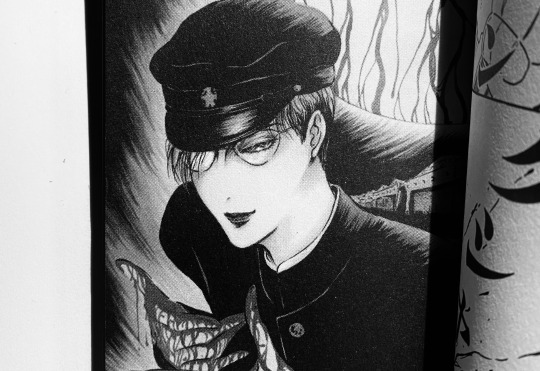
MOON AGE 15 : DAMNATION (English Translation) Moon Age 15: Damnation is a 1988 short comic by pseudonymous author Not Osada, who openly drew influence from the Tokyo Grand Guignol's work in such a way that can arguably give a loose insight to the TGG's mysteriously anomalous works. While only a slight window into what could've existed in Ameya's vision, each contemporary rendering of his world of gore-soaked medical equipment and rusted metal is valuable in what it represents. As mentioned in my prior Litchi essay, the fragments of the Tokyo Grand Guignol we have now are descendants of a cultural phantom, standing as shrouded windows to a strange intangible stage that's positioned somewhere between post-Maruo inferno, industrial subculture and decadent poetry. While Osada’s manga featured notably grizzly and cruelly morbid scenarios, his stories were made explicitly for the shoujo market with a distinctly shoujo-influenced art style. Characters appear almost doll-like with their visual perfections, all while they’re often dismantled and reassembled in bizarre surgical practices by sadistic doctors. Much like how Zera expresses horror to seeing his own imperfect organs in contrast with his youthful appearance, our pristine victims share the same internals as any other slaughtered cadaver, all in a maddening spiral of narratives that contemporary readers often described as resembling descents to insanity. This fixation of the contrast between perceived beauty and grotesqueness is arguably traced back to the Tokyo Grand Guignol’s own works, with lines accentuating the youthful features of certain characters while audience members were known to fondly look back on the actors’ appearances. Litchi himself was described as being a “cute” robot despite the violence it was programed to carry out. It’s possible that this collision is inherent to Ameya’s conceptual destruction of the TGG. A known detractor to poetic writing, he called on a romantic author to pen the screenplays to the TGG’s first three plays so he could “destroy” them in his direction. The use of beauty could arguably be a mockery of it, taking these idealized dolls and leaving them trapped in worlds of fascism and hospital rooms that are haunted by the stinging stench of antiseptics and blood. Plastic hospital drapes were used in place of stage curtains and autopsy films were shown to the wide-eyed characters, who spoke of pure blood and dirty blood, the antithesis of blood, mercuro. What is beauty a representation of in the Grand Guignol’s works with the prominent fascist leanings of the protagonists? Considering the perspectives of our characters where the Hikari Club and the deranged teachers and Nazi doctors are treated as protagonists rather than explicit antagonists, the plays could arguably be read as the decay of a self-convinced beauty under fascist rule. Songs of the pure-blooded ubermensch fading into silence as the singers all collapse, lost in their own delirium as they pump mercurochrome into their hearts and try to rationalize their own organs that resemble the internals of the so-called ‘landraces’ they rendered into lifeless meat. It’s the natural conclusion of fascism, a collapse that occurs in demented violence to the face of a denial of death. I was originally split on publicizing my translation due to copyright-related complications, but after seeing the increasing gatekeeping of TGG materials at the hands of a rapidly growing market riddled with competitive spending and scalping, I feel obliged to share it to the public who (like myself) can’t afford to spend the now literal hundreds that are required to access angura ephemera that was meant to be openly available to the public to begin with. When originally finding this story, the book it was featured in was only 5 dollars. Now it goes for 60 to 200. That's ridiculous. With all the preamble out of the way, the story is under the cut...
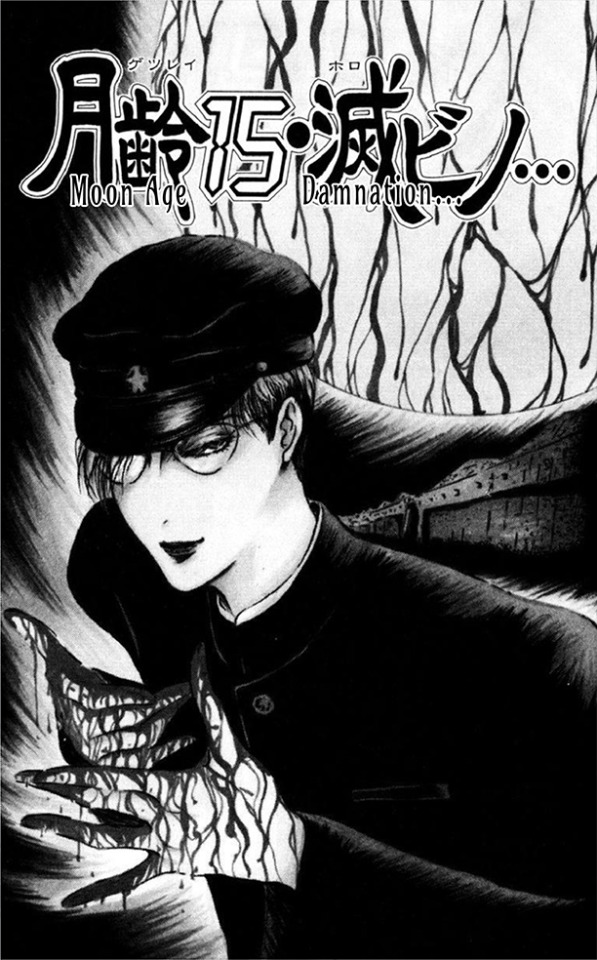
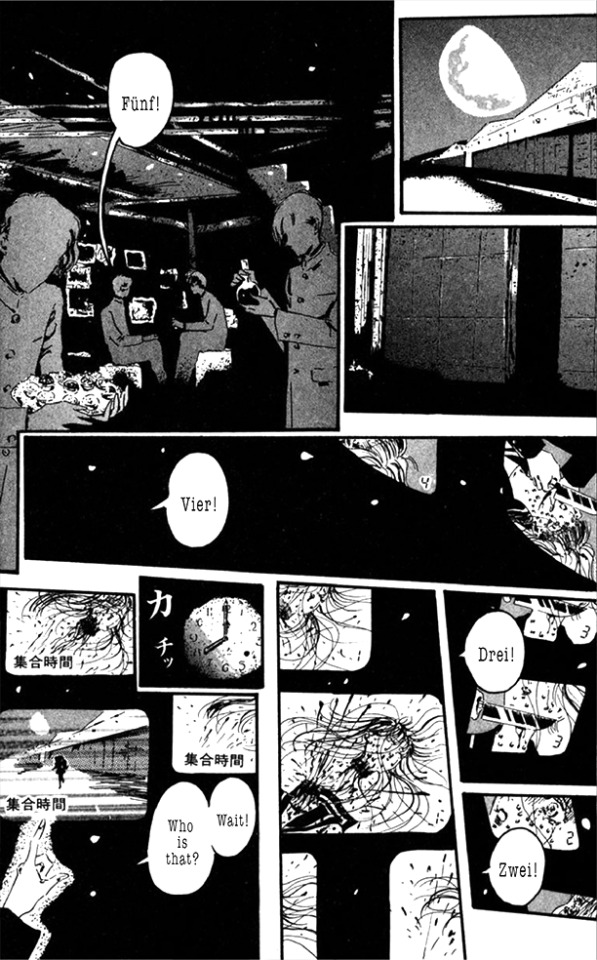
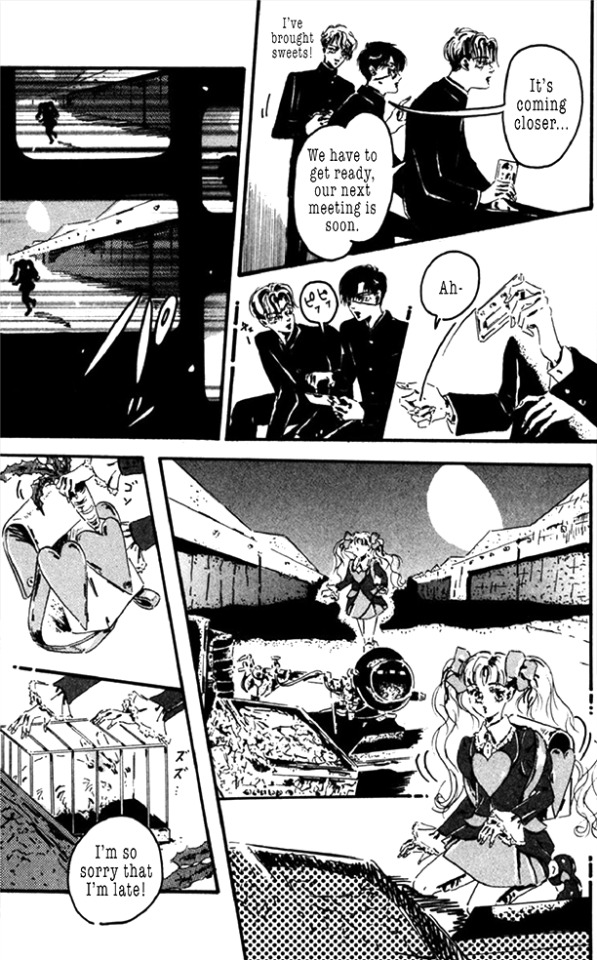
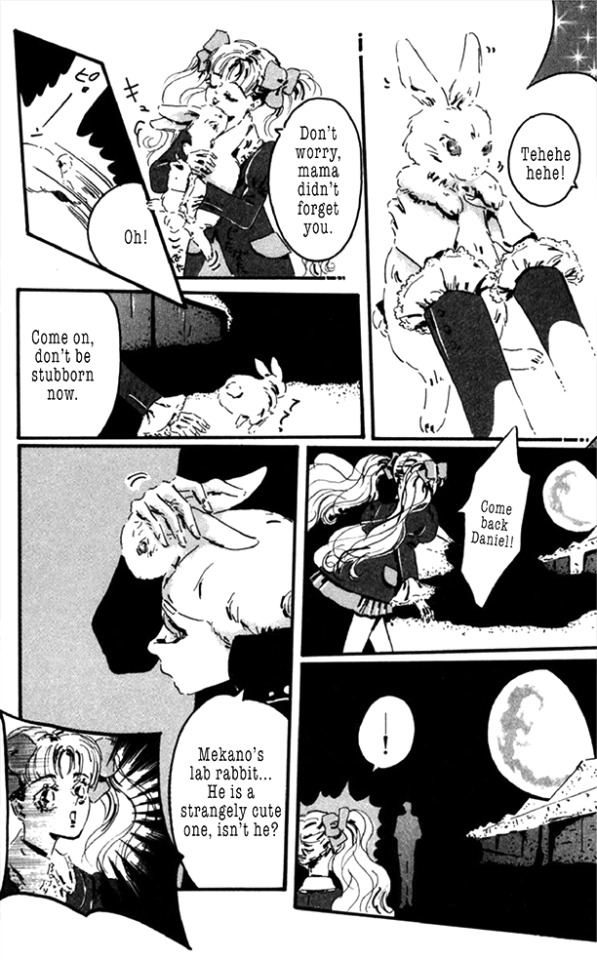
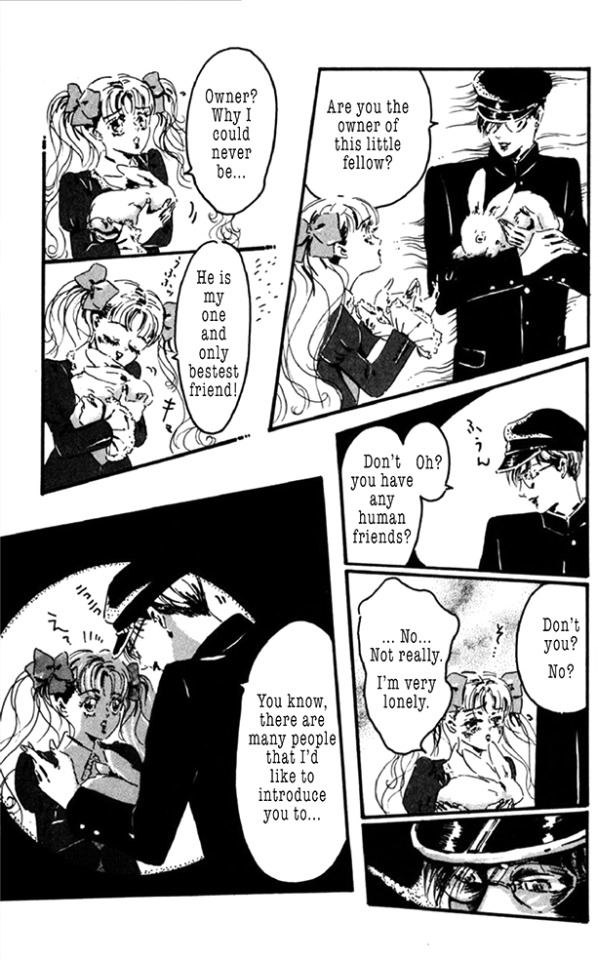
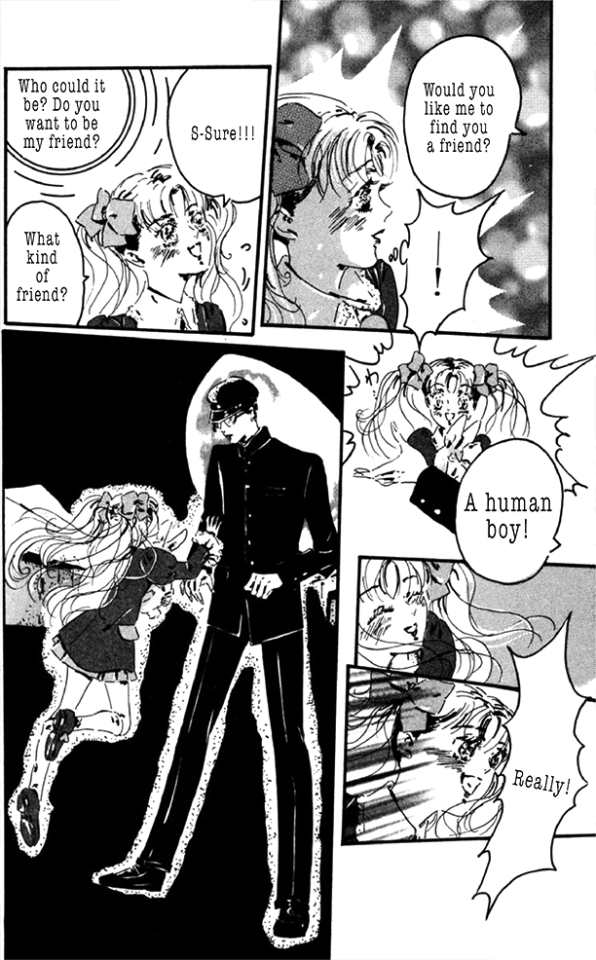
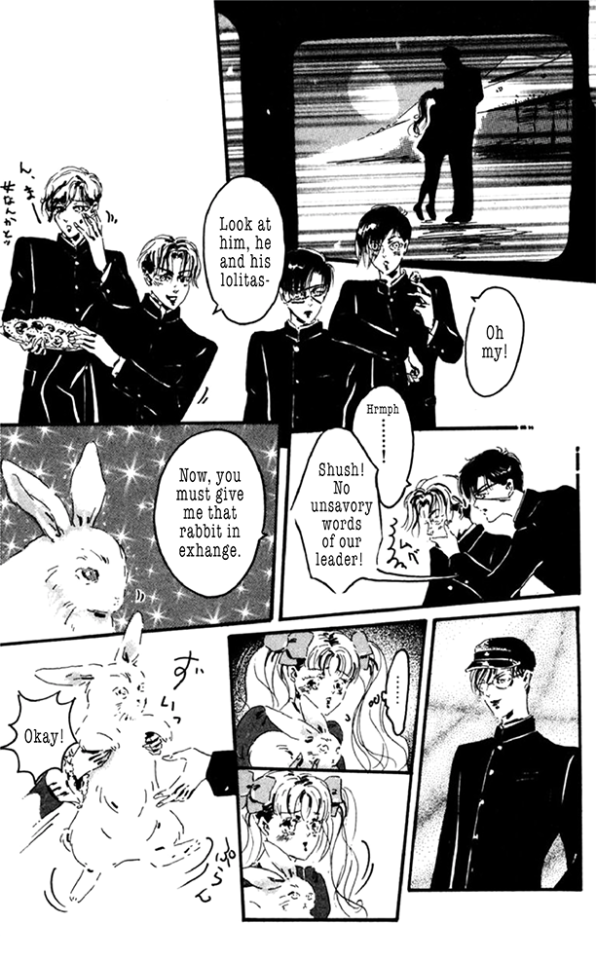
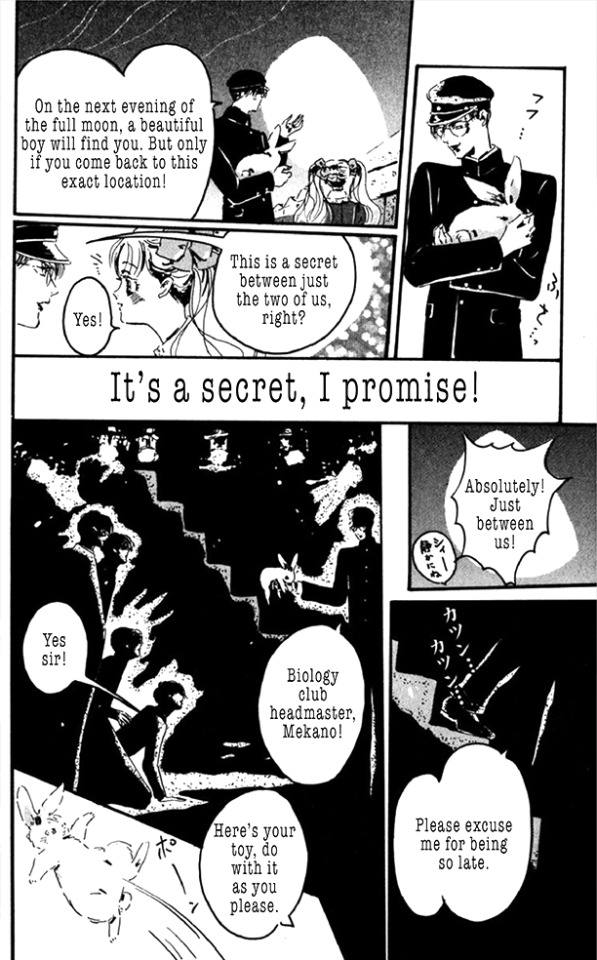
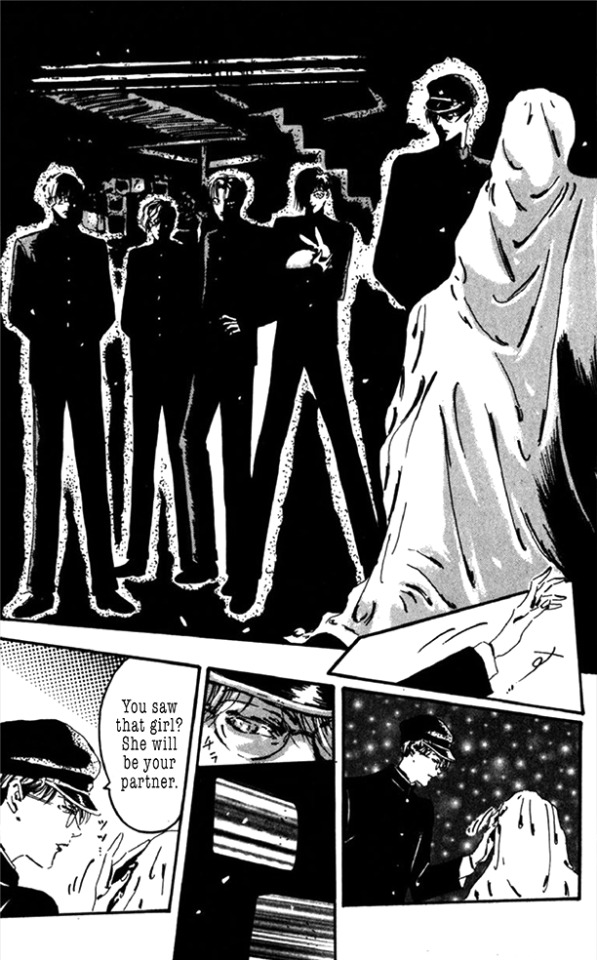
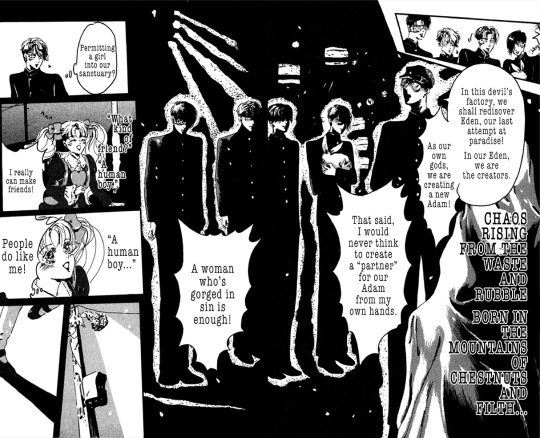
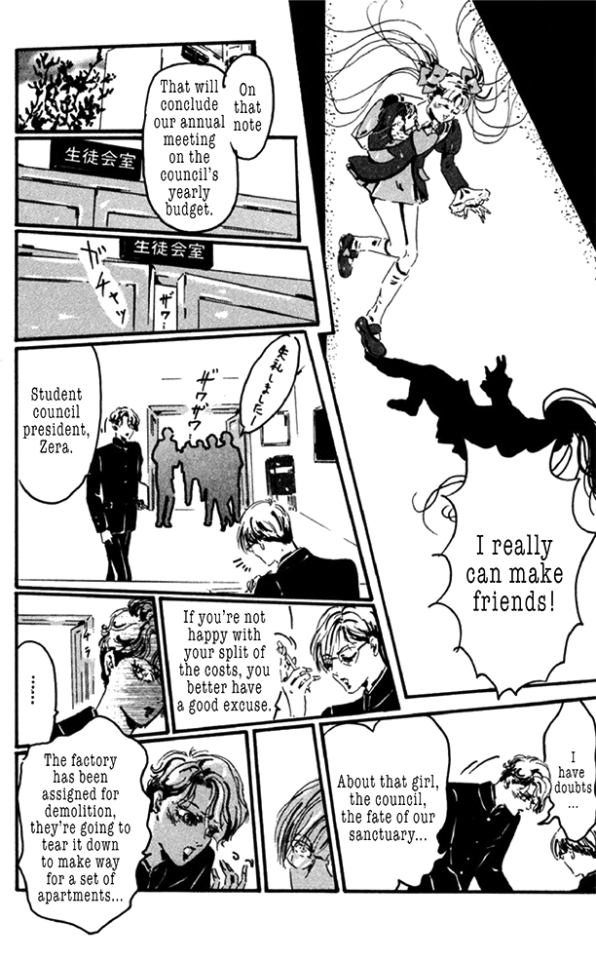
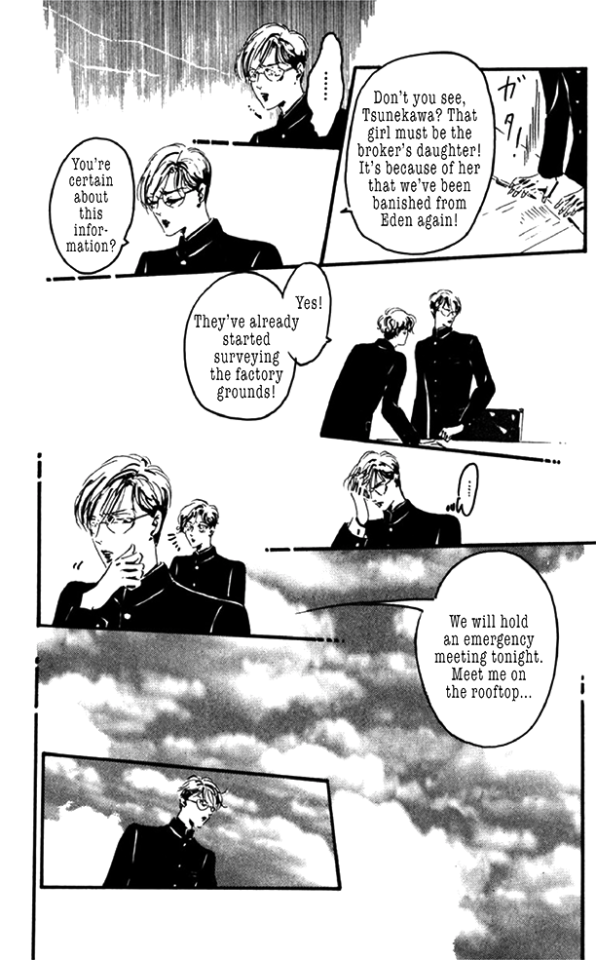
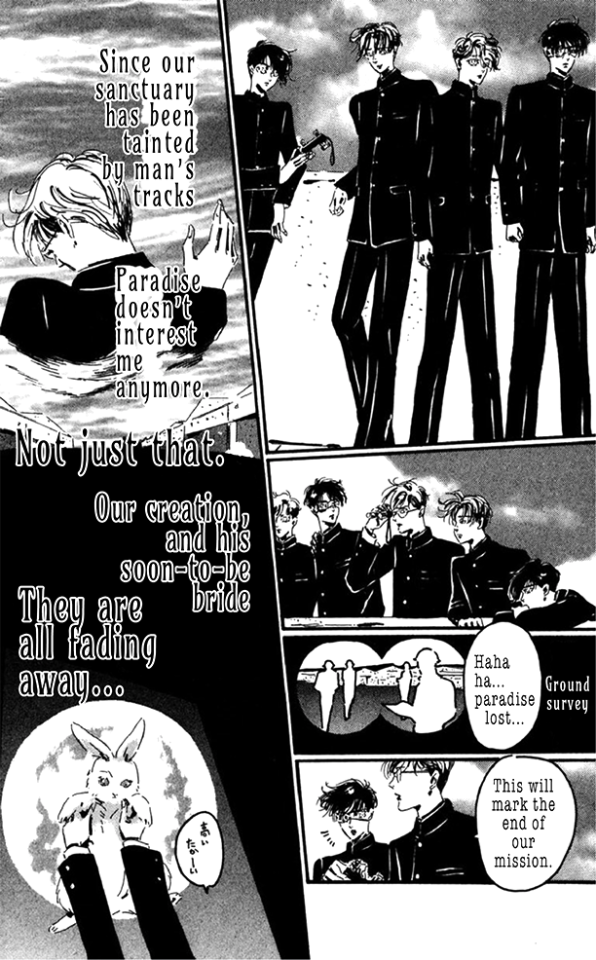
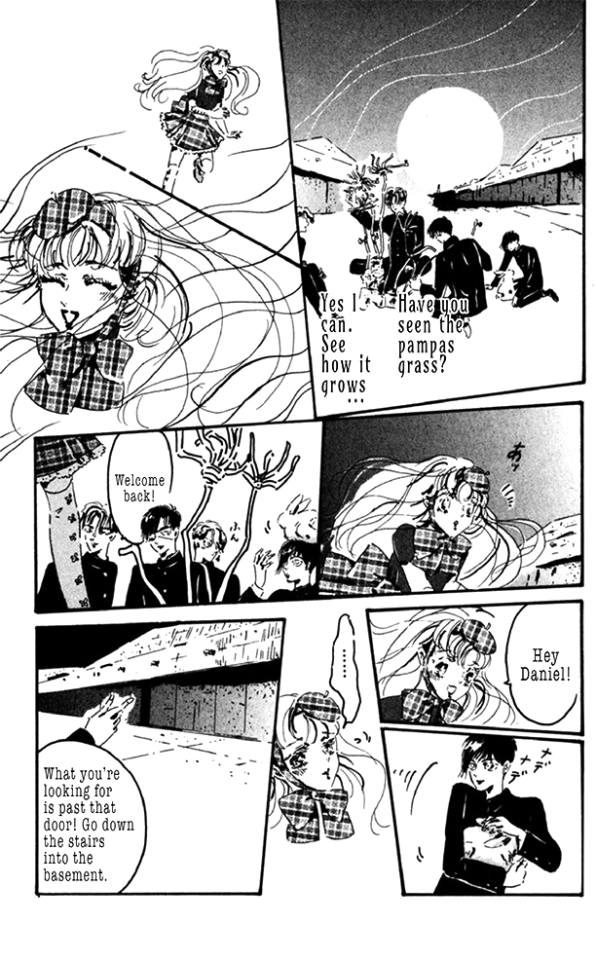
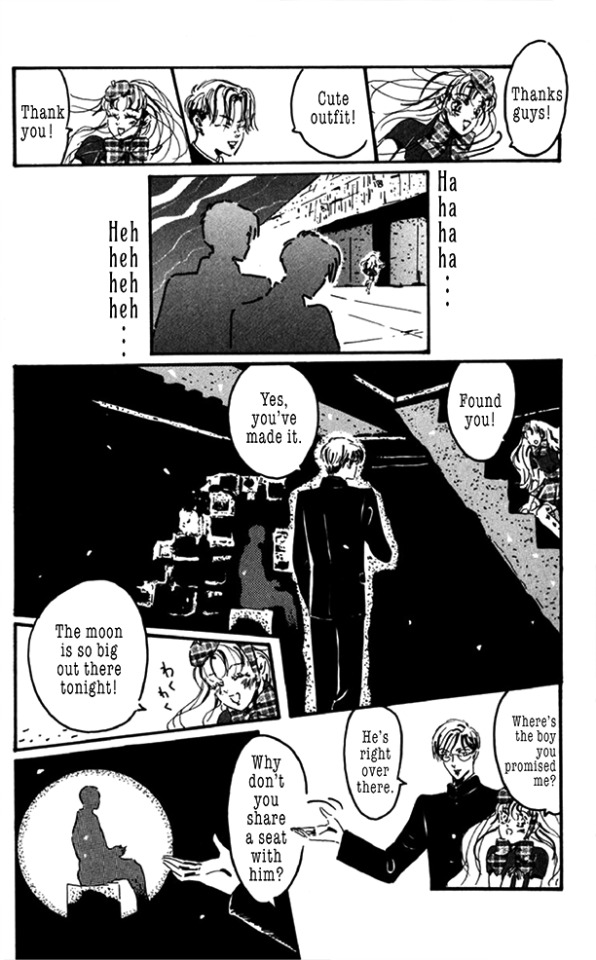
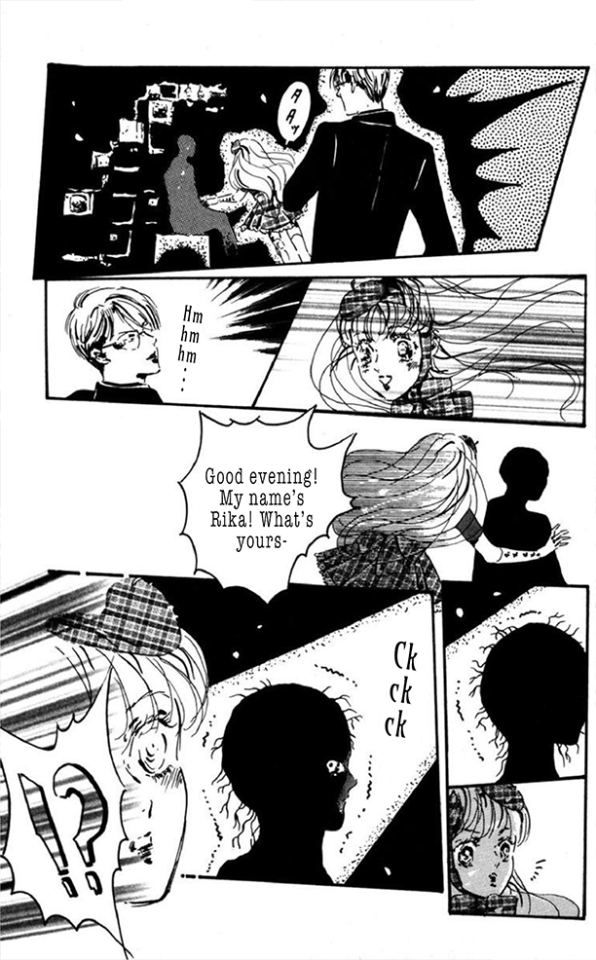
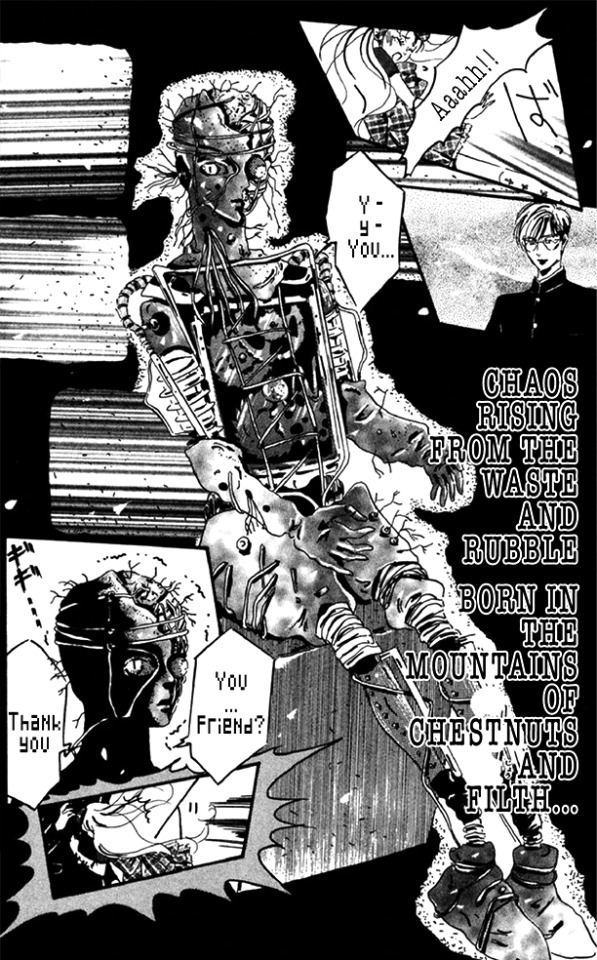
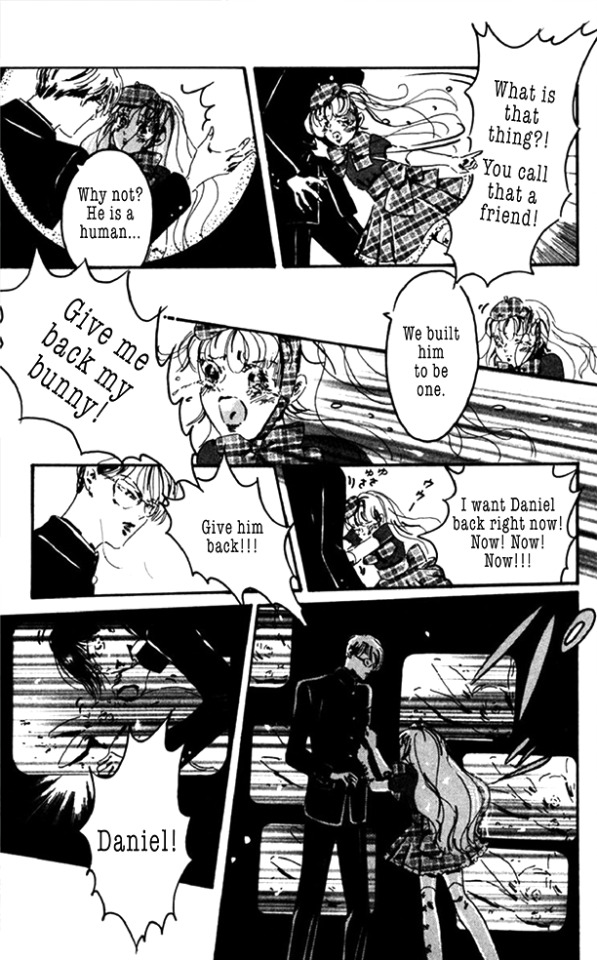
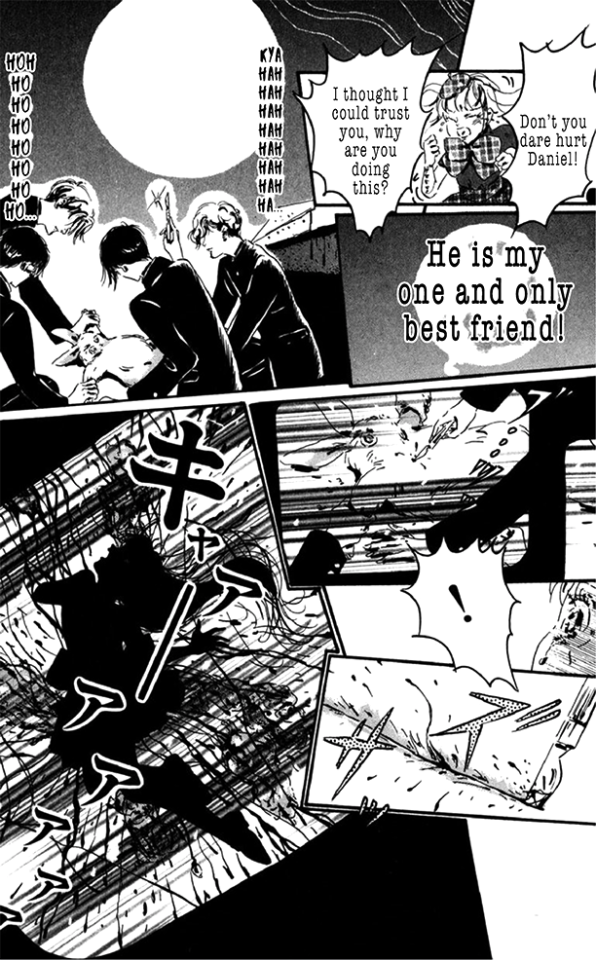
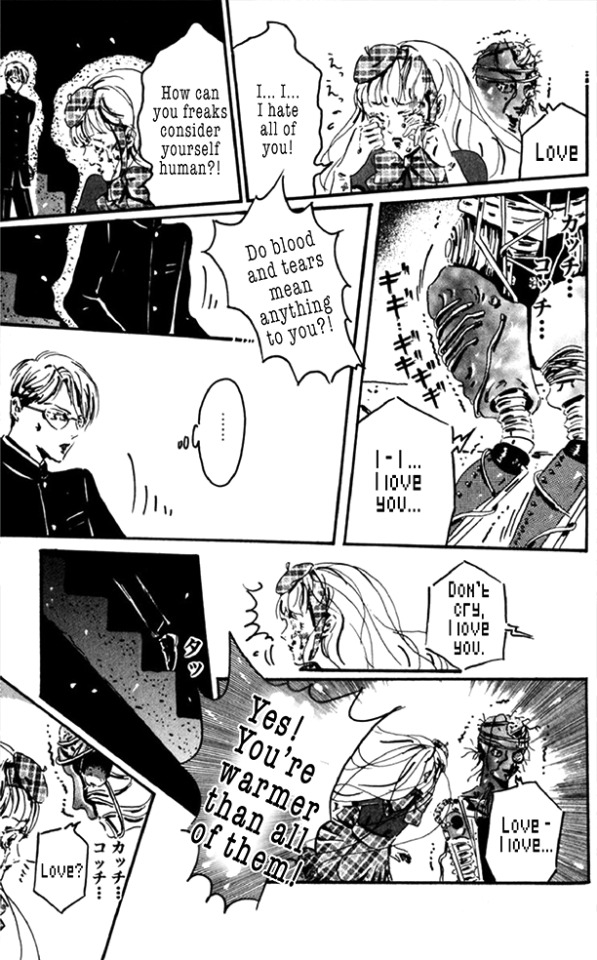
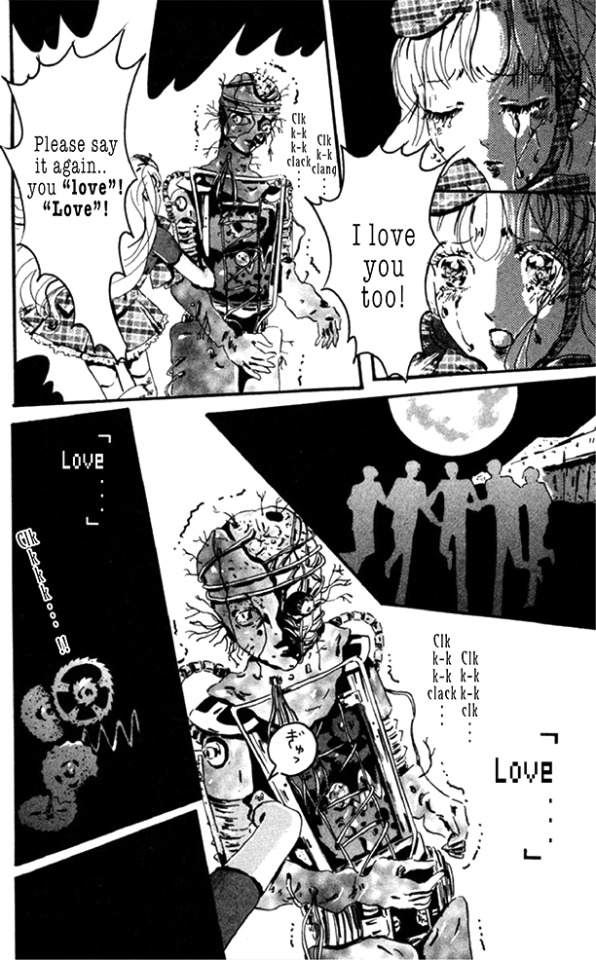
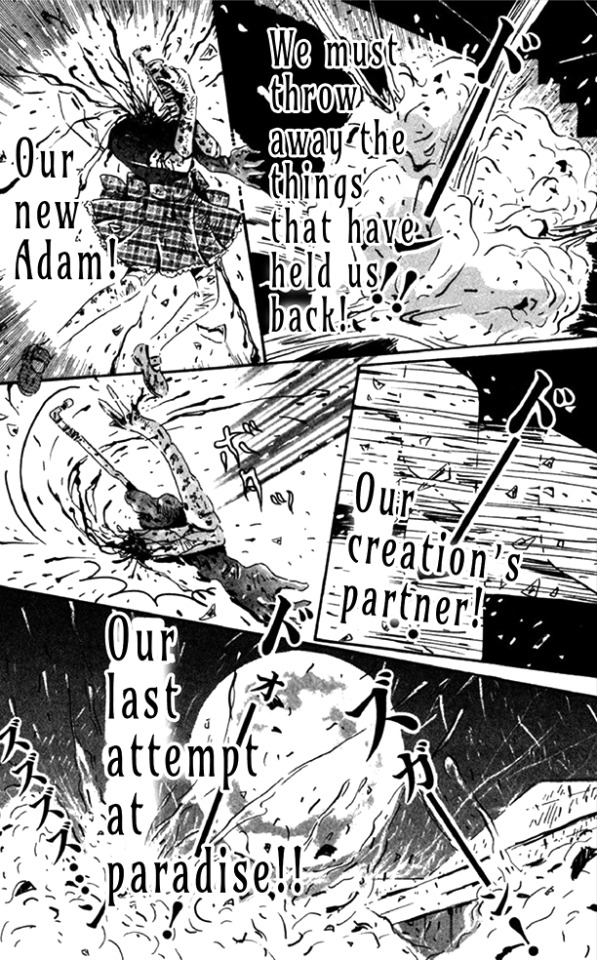

While I made my best effort to maintain accuracy to the source material in translation despite my practically nonexistent understanding of Japanese (my translation method is a Frankensteining of language learning videos, a Japanese to English dictionary from the Internet Archive and Google Translate with a lot of localizing and dissection in between), there are several details I feel I should note for the sake of transparency. One smaller one was the inclusion of the term l * lita. It was in the original text, and I was honestly very unsure of including it in my translation as it’s a term I’m personally icked out by. While I was ultimately recommended to keep the line as is for accuracy, I wish to state that it's a term I'm personally very uncomfortable with in what it represents. The other note, which is the more prominent one in the final product, are the references to The Last Attempt at Paradise. In the original text the club members solely refer to their hideout as paradise and Eden, leaving a lot of excess space in the speech bubbles after translation when making the shift from Japanese text to English. The Last Attempt at Paradise was the name of S.P.K.’s 1982 live album that documents their set at the Off the Wall Hall venue in Lawrence, Kansas. Often considered one of their best concerts and a highlight of the industrial genre, the S.P.K. Appreciation Society of Sydney in their All The Way With S.P.K. / American Tour article describes the concert as being the group's “best performance to date”, further adding that they “Flattened (an) enthusiastic audience with massive P.A. amplification of FX bass regeneration”. This insertion wasn’t done at random, as the Tokyo Grand Guignol’s works were heavily engrained in the original industrial scene of the 80s. Both the 1985 and 1986 performances of Litchi began on a playback of the S.P.K. song Culturcide (from their 1983 Dekompositiones EP), and it was likely that use of the track that led to Not Osada’s early fixation on S.P.K.’s music. At the end of Blind Beast, in a sort of reader Q&A Osada is questioned about some of his favorite music. At the top of the list he features the tracklist of the Dekompositiones EP and the track Mekano from their 1979 Mekano / Contact / Slogun single. Interestingly enough he states that he only likes those four songs from the band, following the text with laughter in regards to their remaining discography. I’m unsure if this means he was unimpressed with their noisier work (which would be curious knowing his liking of Mekano with how it originated from their earliest noise-adjacent album) or if he was directed to their later Machine Age Voodoo material and was alienated by it. In the same Q&A he also mentions the band Funeral Party, who featured specially commissioned art by Suehiro Maruo on their Dream of Embryo single. It's apparent that he also had a copy of the compilation album Vision Of The Emortion, as the list also includes C·C·Mekka and Ego'n Mole, who were both featured in the album alongside Funeral Party's only two other documented tracks, Das Sunde and Gears - Night. S.P.K. references are sprinkled throughout this story along with Osada's other Litchi-adjacent entries. Aside from one of Zera's henchmen being named after the Mekano track, it's very likely that the frequent references to Eden are in homage to the lyrics of Mekano. The first lines of the track include the verses "One by one, odd to even. Break the scenes, rudely eden...".
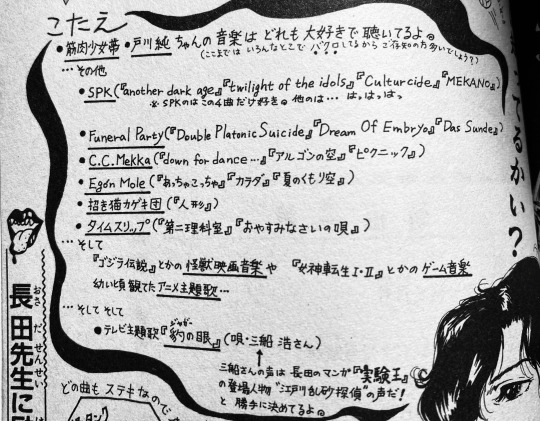
Moon Age 15 was originally printed in 1988 as a two-part miniseries in the horror magazine Complete Collection of Horror and Occult Works - HELP, namely in volumes 5 and 6. While being an early work that derived from the TGG, it still wasn’t the first comic to adapt the Litchi stage play, with Das Blut : Blood and Eternal Girl preceding it with their 1986 publication in Osada’s debut anthology Night Reading Room, sharing the same year as the TGG’s early closure following creative conflicts between Norimizu Ameya and K Tagane (the group's author, who remains anonymous to this day). It’s to be noted however that while Das Blut and Eternal Girl were the first stories to feature the Hikari Club as antagonists, they are only tangentially related with Moon Age showing more distinct Grand Guignol archetypes (musings of the full moon, examinations of the Hikari club’s misogyny, idealization of technology, and even an early rendition of the Litchi robot itself). First kept solely as a brief serial, Moon Age was later reprinted in abridged form as a short story in the 1996 Blind Beast anthology. While copies of HELP are notably hard to find and demand high prices, I was given an in depth view of both volumes that featured Moon Age’s serialization by a collector earlier last year. While the drawings are still the same on a rudimentary level, the length of the serialized version is notably longer than the later Blind Beast variant, with the HELP serialization being over 40 pages while Blind Beast’s is only 24. This was the product of the manga being entirely revised for Blind Beast’s print, with the layouts being drastically altered along with basic revisions of the line art. Certain scenes that would usually take 2 to 3 pages in the HELP version were condensed to 1, resulting in a unique tradeoff where one version feels unusually spacious in its framing while the other is heavily condensed and almost chaotic by comparison. It’s only a thing that springs on you once you compare the two variants, I saw the revised version first and originally didn’t pay any mind to it. One thing that is certain is the polishing of the art. The brush work in the Blind Beast version is refined with a more elaborate sense of weight and flow while the HELP version is notably rough with the prominent use of rudimentary screentones. It reflects as a somewhat rougher variant of the art shown in Night Reading Room. It feels strangely digital, like it’s the product of early computer art. The line-by-line reuse of the decapitation scene from Eternal Girl being shown on the TVs further adds to the strange digital feel of the art style.
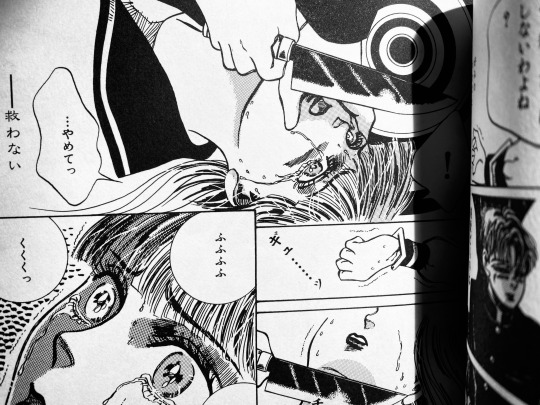
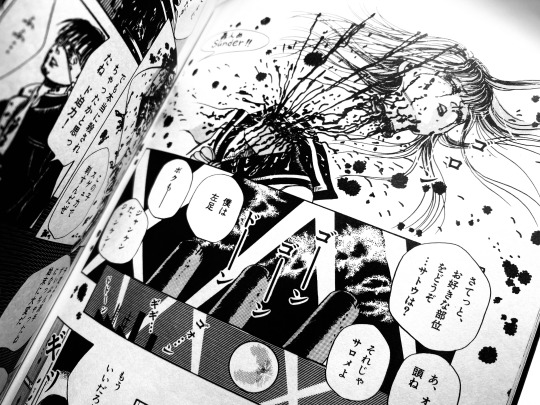
Similar to Moon Age, Osada's other stories of the Hikari Club featured the members luring girls to their brutal deaths. In Eternal Girl the members bring in a student and film her mutilation for a snuff film that acts as the story's namesake, in Das Blut they corner another student to the woods where they hang her, and in Jinta Jinta they kidnap a student who bullied one of her classmates to suicide before trepanning her with a strange device that's somewhere between an electric chair and a drill. Not Osada was very recently namedropped in the concluding essay of an English print of Kawashima Norikazu’s Her Frankenstein under the alternate Nagata Nooto anglicization of Osada’s pseudonym. Their name is a curious case as while there is a prominent written variant (長田ノオト), it’s seen numerous English iterations. In Osada’s own English signatures it is written as Not Osada (with the name apparently being derived from a German phrase), but other variants include Osada Nohto, Osada Nooto and Not Nagata. If I'm not mistaken, it could count as one of the first English acknowledgements of Osada's works in print.
81 notes
·
View notes
Text
Was gonna have a therapy appointment today, then as my appointment was supposed to begin my grandma gets a call saying our insurance stopped covering my medical provider entirely. So not just therapy got canceled, my appointments with an entire organization, medicine appointments from them, now we gotta set all that up with another provider. Bro I hate the medical industry, with my life on god.
Gotta get new doctors I don't know, explain everything again to them about my surgery and how it's going. As well as literally everything else that can't be done with records.
31 notes
·
View notes
Note
I love your dabbles!! And time travel is my favorite!
Can we get more if the ironstrange time travel when Tony shows up in the hospital room? Maybe an outsiders POV?
Oooh, one of my favourites of the ficlets and outsider POV! This is a very fun prompt. :D
We could get more outsider-y than Christine, but I felt like her familiarity with pre-accident Stephen would make the contrast more interesting.
It also occurred to me when I was almost done that you might have wanted something a little further along in the development of this timeline, but this is what I thought of when I pondered outsider POVs. Hopefully it is still enjoyable!
-
Christine could hear Stephen’s voice, crisp and animated, long before she approached his hospital room. That could mean only one thing: Mr. Stark was visiting.
In the days after Stephen was recovered from the wreck and before he woke from surgery, Christine had braced herself for denial, or fury, or depression. Operating was everything to Stephen. It had certainly meant more to him than their relationship. She’d braced herself for a viciously rocky road to whatever recovery he could make, and for the first few hours, it had seemed like depression had won the lottery. Stephen had been so silent. It was an unsettling reaction from a man who had opinions on everything, especially everything medical.
And then Tony Stark had arrived and it was like the entire world went screwy.
Not only had Stephen snapped out of his nascent depression, he didn’t even seem to care about his hands. He didn’t denigrate the work of his doctors, he didn’t ask for a second opinion. He didn’t even ask to see his own films! Instead he spent every waking moment—literally—deep in discussion with man he’d once described as the worst possible expression of the military-industrial complex. And that had been after Stark’s establishment as Iron Man. Just because now he’s keeping the bombs for his personal use, Stephen had said once, doesn’t make him a hero.
Honestly, if Stephen hadn’t been in a hospital, closely monitored, Christine would have suspected Stark of… of… something. She couldn’t think of any drug or bribe or whatever that would turn Stephen’s opinion around so dramatically, but it still made more sense than reality! Christine couldn’t even call it a nervous breakdown—Stephen somehow seemed better adjusted than before his crash.
Shaking her head, Christine continued on her way to Stephen’s room. She’d promised herself she’d be there for him, even if the role she’d expected to take had somehow been co-opted by Tony Stark.
“…not sure,” Stephen was saying as she approached. “The first time I was in hospital for a month, but I didn’t have anyone to help me care for myself. Christine tried, but I was… not receptive.”
The first time? Christine didn’t think he’d ever been hospitalized before.
Stephen looked up and saw her in the doorway and any chance at more information was lost. “Christine!” Stephen said warmly as Mr. Stark dismissed a hologram. Christine only glimpsed enough to guess it was some sort of timeline before it was gone. “Tony and I were just speculating when I might be released. I don’t suppose you have any inside information?”
“Ah, no, I’m afraid not,” Christine said, somehow thrown off balance again. “It would probably depend on how much support you have. Your apartment—“
“Nah, he’ll be staying with me,” Mr. Stark jumped in. “I can get you whatever support you need,” he told Stephen. “Nurses, accessibility features, you name it.”
Christine’s gaze flew to Stephen, expecting him to flinch at ‘accessibility,’ but he just nodded. “Thank you, that will help. The sooner I can get out of here, the better.”
“Stephen, are you sure you’re comfortable with that?” Christine jumped in, glancing at Mr. Stark.
“I won’t be freeloading,” Stephen assured her, as if that was the problem. “Tony and I have a big project to get started on.”
“Huge, world changing project,” Mr. Stark added brightly. Then he got a considering look on his face and turned to Stephen. “We’re going to need support staff. Do you think—?”
Stephen hummed thoughtfully. “It wouldn’t have worked before, but this time, maybe.”
“We’ll add it to the list,” Tony said.
Christine could only glance between them. It felt like she was missing half the conversation, but, somehow, she suspected it was a lot more than half.
41 notes
·
View notes
Note
They literally farm pregnant (raped over and over medically) female horses for their urine, dehydrating them and keeping them in a stall for their entire life, stealing their babies. Keeping the daughters for the urine farm and selling/slaughtering the males. It's a big business, and the urine is farmed for estrogen both for women and HRT. There are effective synthetic options. The horses feed into the meat industry at time of death typically. If you can't see this as a feminist issue, I am appalled. It's dystopian what they go through. A female animal raped for life, unable to see the sun or lick her daughter clean, born into the same misery.
Feminist issues are those which tackle oppression of female humans, women and girls.
This is an awful thing that should not be happening. This is an animal rights issue. There can be overlap, but as I said before, if we include all female animals in feminism or the definition of misogyny, 1) that’s dehumanizing to female humans and 2) that’s efforts going towards literal animals instead of human women and girls.
You go fight for that. You talk all about it and I’ll support you, but don’t come to me “requiring” that I refocus my feminism towards livestock instead of centering it on women and girls.
Call me a LSERF if you feel the need, I’ll be your livestock exclusionary radical feminist.
21 notes
·
View notes
Text
Hey what the fuck is this news story?
“ But the world’s largest economies are already there: The total fertility rate among the OECD’s 38 member countries dropped to just 1.5 children per woman in 2022 from 3.3 children in 1960. That’s well below the “replacement level” of 2.1 children per woman needed to keep populations constant.
That means the supply of workers in many countries is quickly diminishing.
In the 1960s, there were six people of working age for every retired person, according to the World Economic Forum. Today, the ratio is closer to three-to-one. By 2035, it’s expected to be two-to-one.
Top executives at publicly traded US companies mentioned labor shortages nearly 7,000 times in earnings calls over the last decade, according to an analysis by the Federal Reserve Bank of St. Louis last week.
“A reduction in the share of workers can lead to labor shortages, which may raise the bargaining power of employees and lift wages — all of which is ultimately inflationary,” Simona Paravani-Mellinghoff, managing director at BlackRock, wrote in an analysis last year. “
Is this seriously how normal people think? Improving the bargaining power of workers and increased wages are bad?
“ And while net immigration has helped offset demographic problems facing rich countries in the past, the shrinking population is now a global phenomenon. “This is critical because it implies advanced economies may start to struggle to ‘import’ labour from such places either via migration or sourcing goods,” wrote Paravani-Mellinghoff.
By 2100, only six countries are expected to be having enough children to keep their populations stable: Africa’s Chad, Niger and Somalia, the Pacific islands of Samoa and Tonga, and Tajikistan, according to research published by the Lancet, a medical journal.
BlackRock’s expert advises her clients to invest in inflation-linked bonds, as well as inflation-hedging commodities like energy, industrial metals and agriculture and livestock.
Import labor via migration or sourcing goods? My brother in Christ they are modern day slaves!! I feel like I’m in backwards town reading this what the fuck?!
“ Elon Musk, father of 12 children, has remarked that falling birthrates will lead to “a civilization that ends not with a bang but a whimper, in adult diapers.”
While his words are incendiary, they’re not entirely wrong
P&G and Kimberly-Clark, which together make up more than half of the US diaper market, have seen baby diaper sales decline over the past few years. But adult diapers sales, they say, are a bright spot in their portfolios. “
Oh now the guy with a breeding kink is going to lecture us. Great. /s
“ The AI solution: Some business leaders and technologists see the boom in productivity through artificial intelligence as a potential solution.
“Here are the facts. We are not having enough children, and we have not been having enough children for long enough that there is a demographic crisis, former Google CEO and executive chairman Eric Schmidt said at the Wall Street Journal’s CEO Council Summit in London last year.
“In aggregate, all the demographics say there’s going to be shortage of humans for jobs. Literally too many jobs and not enough people for at least the next 30 years,” Schmidt said.
Oh god not the AI tech bros coming into this shit too. Wasn’t the purpose of improving tech to give people more free time? So they can relax and spend time with family more and actually enjoy life? Isn’t our economy already bloated with useless pencil-pushing number-crunching desk jobs that ultimately don’t serve a purpose?
I’m not going to post the entire article but give it a read. It’s… certainly something. Anyway degrowth is the way of the future.
54 notes
·
View notes
Text
I hope the conversations around medical insurance companies start to expand to other big companies and industries that harm or kill people because the impact they have is not talked about or challenged enough
E.g:
The medical industry as a whole (not just the insurance) and how its discrimination against women, queer people, poc people, disabled people, fat people and more leads to people dying due to not being believed or taken seriously.
The cigarette and alcohol industries that sell addictive and life ruining products that cause cancer or active harm to those who don't buy them (e.g: second hand smoke inhalation). The advertisement of cigarettes is literally illegal because of the health risk, and yet they can still be sold on mass. It comes with the warning of the risk of cancer and addiction, but nobody questions the billions of dollars made from selling them to addicts. But yeah, weed is the big bad evil. And pain killers and medicine, can't take our seriously sick patients or mentally ill patients seriously (medical industry) because what if they're addicts looking for a handout??? What if meds to treat mental health are addictive???/s
Alcohol and alcohol consumption is still advertised everywhere no matter what and is culturally framed as a must do, something that makes you mature and cool while simultaneously blaming alcholics for their addiction. Just ask anyone who says they don't drink and are called a killjoy or a boring person. Think about the fact that the hero mc of a movie is shown to be dapper, charming, or cool through alcohol, whether it be the way he drinks it or the type of alcohol he's drinking. Hell, cigarettes are used for the same thing, too.
The beauty industry promotes blatantly unhealthy bodies as the standard that should be achieved and promotes medication, surgeries, and more that can be incredibly risky in order to achieve beauty. Cosmetic items like makeup are so poorly regulated that they can cause chemical burns. And yet when I type "can makeup" the first thing that pops up is "can makeup cause pimples." Cause pimples aren't pretty, and that's what should be the concern/s
The "health" industry and how it works with the beauty industry to spread incorrect "medical facts" about health and weight to advertise weight loss pills and diets and so on that encourage or cause eating disorders and general unhealthiness (no matter what you think or what these companies say, suddenly rapidly losing weight is NOT healthy and is NOT a "solution to weight gain").
If I ask whether a certain food or shake or whatever is healthy the first response should not be "it causes weight gain/weight loss" because that is not actually an indicator or how healthy something is. But when people's main concern is avoiding gaining weight because that is viewed as ugly, of course you're gonna tell them "It's healthy, it makes you lose weight, buy my product! Of course I'm concerned about your health now buy my product!"
The gambling industry and how it actively uses psychological tricks to ensure people will stay and continue to gamble. It actively takes advantage of gambling addicts and, through mass advertising and subtle tricks, encourage and worsen their addiction and cause them to lose money and put themselves and their families at risk. Gambling is oh so taboo, but it sure doesn't stop my 7 year old brother from sitting through an unskippable Hollywood Bets ad when he just wanted me to show him funny cat videos.
I can go on but I'm sleepy, so just consider these examples. There's a lotta shit that needs to be challenged and criticised.
#quinn quips#anti capitalism#medical discrimination#medical abuse#fatphobia#anti beauty industry#anti beauty culture#brian thompson#uhc ceo#ableism
21 notes
·
View notes